
Research Topics & Ideas: Finance
120+ Finance Research Topic Ideas To Fast-Track Your Project
If you’re just starting out exploring potential research topics for your finance-related dissertation, thesis or research project, you’ve come to the right place. In this post, we’ll help kickstart your research topic ideation process by providing a hearty list of finance-centric research topics and ideas.
PS – This is just the start…
We know it’s exciting to run through a list of research topics, but please keep in mind that this list is just a starting point . To develop a suitable education-related research topic, you’ll need to identify a clear and convincing research gap , and a viable plan of action to fill that gap.
If this sounds foreign to you, check out our free research topic webinar that explores how to find and refine a high-quality research topic, from scratch. Alternatively, if you’d like hands-on help, consider our 1-on-1 coaching service .
Overview: Finance Research Topics
- Corporate finance topics
- Investment banking topics
- Private equity & VC
- Asset management
- Hedge funds
- Financial planning & advisory
- Quantitative finance
- Treasury management
- Financial technology (FinTech)
- Commercial banking
- International finance

Corporate Finance
These research topic ideas explore a breadth of issues ranging from the examination of capital structure to the exploration of financial strategies in mergers and acquisitions.
- Evaluating the impact of capital structure on firm performance across different industries
- Assessing the effectiveness of financial management practices in emerging markets
- A comparative analysis of the cost of capital and financial structure in multinational corporations across different regulatory environments
- Examining how integrating sustainability and CSR initiatives affect a corporation’s financial performance and brand reputation
- Analysing how rigorous financial analysis informs strategic decisions and contributes to corporate growth
- Examining the relationship between corporate governance structures and financial performance
- A comparative analysis of financing strategies among mergers and acquisitions
- Evaluating the importance of financial transparency and its impact on investor relations and trust
- Investigating the role of financial flexibility in strategic investment decisions during economic downturns
- Investigating how different dividend policies affect shareholder value and the firm’s financial performance
Investment Banking
The list below presents a series of research topics exploring the multifaceted dimensions of investment banking, with a particular focus on its evolution following the 2008 financial crisis.
- Analysing the evolution and impact of regulatory frameworks in investment banking post-2008 financial crisis
- Investigating the challenges and opportunities associated with cross-border M&As facilitated by investment banks.
- Evaluating the role of investment banks in facilitating mergers and acquisitions in emerging markets
- Analysing the transformation brought about by digital technologies in the delivery of investment banking services and its effects on efficiency and client satisfaction.
- Evaluating the role of investment banks in promoting sustainable finance and the integration of Environmental, Social, and Governance (ESG) criteria in investment decisions.
- Assessing the impact of technology on the efficiency and effectiveness of investment banking services
- Examining the effectiveness of investment banks in pricing and marketing IPOs, and the subsequent performance of these IPOs in the stock market.
- A comparative analysis of different risk management strategies employed by investment banks
- Examining the relationship between investment banking fees and corporate performance
- A comparative analysis of competitive strategies employed by leading investment banks and their impact on market share and profitability
Private Equity & Venture Capital (VC)
These research topic ideas are centred on venture capital and private equity investments, with a focus on their impact on technological startups, emerging technologies, and broader economic ecosystems.
- Investigating the determinants of successful venture capital investments in tech startups
- Analysing the trends and outcomes of venture capital funding in emerging technologies such as artificial intelligence, blockchain, or clean energy
- Assessing the performance and return on investment of different exit strategies employed by venture capital firms
- Assessing the impact of private equity investments on the financial performance of SMEs
- Analysing the role of venture capital in fostering innovation and entrepreneurship
- Evaluating the exit strategies of private equity firms: A comparative analysis
- Exploring the ethical considerations in private equity and venture capital financing
- Investigating how private equity ownership influences operational efficiency and overall business performance
- Evaluating the effectiveness of corporate governance structures in companies backed by private equity investments
- Examining how the regulatory environment in different regions affects the operations, investments and performance of private equity and venture capital firms

Asset Management
This list includes a range of research topic ideas focused on asset management, probing into the effectiveness of various strategies, the integration of technology, and the alignment with ethical principles among other key dimensions.
- Analysing the effectiveness of different asset allocation strategies in diverse economic environments
- Analysing the methodologies and effectiveness of performance attribution in asset management firms
- Assessing the impact of environmental, social, and governance (ESG) criteria on fund performance
- Examining the role of robo-advisors in modern asset management
- Evaluating how advancements in technology are reshaping portfolio management strategies within asset management firms
- Evaluating the performance persistence of mutual funds and hedge funds
- Investigating the long-term performance of portfolios managed with ethical or socially responsible investing principles
- Investigating the behavioural biases in individual and institutional investment decisions
- Examining the asset allocation strategies employed by pension funds and their impact on long-term fund performance
- Assessing the operational efficiency of asset management firms and its correlation with fund performance
Hedge Funds
Here we explore research topics related to hedge fund operations and strategies, including their implications on corporate governance, financial market stability, and regulatory compliance among other critical facets.
- Assessing the impact of hedge fund activism on corporate governance and financial performance
- Analysing the effectiveness and implications of market-neutral strategies employed by hedge funds
- Investigating how different fee structures impact the performance and investor attraction to hedge funds
- Evaluating the contribution of hedge funds to financial market liquidity and the implications for market stability
- Analysing the risk-return profile of hedge fund strategies during financial crises
- Evaluating the influence of regulatory changes on hedge fund operations and performance
- Examining the level of transparency and disclosure practices in the hedge fund industry and its impact on investor trust and regulatory compliance
- Assessing the contribution of hedge funds to systemic risk in financial markets, and the effectiveness of regulatory measures in mitigating such risks
- Examining the role of hedge funds in financial market stability
- Investigating the determinants of hedge fund success: A comparative analysis
Financial Planning and Advisory
This list explores various research topic ideas related to financial planning, focusing on the effects of financial literacy, the adoption of digital tools, taxation policies, and the role of financial advisors.
- Evaluating the impact of financial literacy on individual financial planning effectiveness
- Analysing how different taxation policies influence financial planning strategies among individuals and businesses
- Evaluating the effectiveness and user adoption of digital tools in modern financial planning practices
- Investigating the adequacy of long-term financial planning strategies in ensuring retirement security
- Assessing the role of financial education in shaping financial planning behaviour among different demographic groups
- Examining the impact of psychological biases on financial planning and decision-making, and strategies to mitigate these biases
- Assessing the behavioural factors influencing financial planning decisions
- Examining the role of financial advisors in managing retirement savings
- A comparative analysis of traditional versus robo-advisory in financial planning
- Investigating the ethics of financial advisory practices

The following list delves into research topics within the insurance sector, touching on the technological transformations, regulatory shifts, and evolving consumer behaviours among other pivotal aspects.
- Analysing the impact of technology adoption on insurance pricing and risk management
- Analysing the influence of Insurtech innovations on the competitive dynamics and consumer choices in insurance markets
- Investigating the factors affecting consumer behaviour in insurance product selection and the role of digital channels in influencing decisions
- Assessing the effect of regulatory changes on insurance product offerings
- Examining the determinants of insurance penetration in emerging markets
- Evaluating the operational efficiency of claims management processes in insurance companies and its impact on customer satisfaction
- Examining the evolution and effectiveness of risk assessment models used in insurance underwriting and their impact on pricing and coverage
- Evaluating the role of insurance in financial stability and economic development
- Investigating the impact of climate change on insurance models and products
- Exploring the challenges and opportunities in underwriting cyber insurance in the face of evolving cyber threats and regulations
Quantitative Finance
These topic ideas span the development of asset pricing models, evaluation of machine learning algorithms, and the exploration of ethical implications among other pivotal areas.
- Developing and testing new quantitative models for asset pricing
- Analysing the effectiveness and limitations of machine learning algorithms in predicting financial market movements
- Assessing the effectiveness of various risk management techniques in quantitative finance
- Evaluating the advancements in portfolio optimisation techniques and their impact on risk-adjusted returns
- Evaluating the impact of high-frequency trading on market efficiency and stability
- Investigating the influence of algorithmic trading strategies on market efficiency and liquidity
- Examining the risk parity approach in asset allocation and its effectiveness in different market conditions
- Examining the application of machine learning and artificial intelligence in quantitative financial analysis
- Investigating the ethical implications of quantitative financial innovations
- Assessing the profitability and market impact of statistical arbitrage strategies considering different market microstructures
Treasury Management
The following topic ideas explore treasury management, focusing on modernisation through technological advancements, the impact on firm liquidity, and the intertwined relationship with corporate governance among other crucial areas.
- Analysing the impact of treasury management practices on firm liquidity and profitability
- Analysing the role of automation in enhancing operational efficiency and strategic decision-making in treasury management
- Evaluating the effectiveness of various cash management strategies in multinational corporations
- Investigating the potential of blockchain technology in streamlining treasury operations and enhancing transparency
- Examining the role of treasury management in mitigating financial risks
- Evaluating the accuracy and effectiveness of various cash flow forecasting techniques employed in treasury management
- Assessing the impact of technological advancements on treasury management operations
- Examining the effectiveness of different foreign exchange risk management strategies employed by treasury managers in multinational corporations
- Assessing the impact of regulatory compliance requirements on the operational and strategic aspects of treasury management
- Investigating the relationship between treasury management and corporate governance
Financial Technology (FinTech)
The following research topic ideas explore the transformative potential of blockchain, the rise of open banking, and the burgeoning landscape of peer-to-peer lending among other focal areas.
- Evaluating the impact of blockchain technology on financial services
- Investigating the implications of open banking on consumer data privacy and financial services competition
- Assessing the role of FinTech in financial inclusion in emerging markets
- Analysing the role of peer-to-peer lending platforms in promoting financial inclusion and their impact on traditional banking systems
- Examining the cybersecurity challenges faced by FinTech firms and the regulatory measures to ensure data protection and financial stability
- Examining the regulatory challenges and opportunities in the FinTech ecosystem
- Assessing the impact of artificial intelligence on the delivery of financial services, customer experience, and operational efficiency within FinTech firms
- Analysing the adoption and impact of cryptocurrencies on traditional financial systems
- Investigating the determinants of success for FinTech startups

Commercial Banking
These topic ideas span commercial banking, encompassing digital transformation, support for small and medium-sized enterprises (SMEs), and the evolving regulatory and competitive landscape among other key themes.
- Assessing the impact of digital transformation on commercial banking services and competitiveness
- Analysing the impact of digital transformation on customer experience and operational efficiency in commercial banking
- Evaluating the role of commercial banks in supporting small and medium-sized enterprises (SMEs)
- Investigating the effectiveness of credit risk management practices and their impact on bank profitability and financial stability
- Examining the relationship between commercial banking practices and financial stability
- Evaluating the implications of open banking frameworks on the competitive landscape and service innovation in commercial banking
- Assessing how regulatory changes affect lending practices and risk appetite of commercial banks
- Examining how commercial banks are adapting their strategies in response to competition from FinTech firms and changing consumer preferences
- Analysing the impact of regulatory compliance on commercial banking operations
- Investigating the determinants of customer satisfaction and loyalty in commercial banking
International Finance
The folowing research topic ideas are centred around international finance and global economic dynamics, delving into aspects like exchange rate fluctuations, international financial regulations, and the role of international financial institutions among other pivotal areas.
- Analysing the determinants of exchange rate fluctuations and their impact on international trade
- Analysing the influence of global trade agreements on international financial flows and foreign direct investments
- Evaluating the effectiveness of international portfolio diversification strategies in mitigating risks and enhancing returns
- Evaluating the role of international financial institutions in global financial stability
- Investigating the role and implications of offshore financial centres on international financial stability and regulatory harmonisation
- Examining the impact of global financial crises on emerging market economies
- Examining the challenges and regulatory frameworks associated with cross-border banking operations
- Assessing the effectiveness of international financial regulations
- Investigating the challenges and opportunities of cross-border mergers and acquisitions
Choosing A Research Topic
These finance-related research topic ideas are starting points to guide your thinking. They are intentionally very broad and open-ended. By engaging with the currently literature in your field of interest, you’ll be able to narrow down your focus to a specific research gap .
When choosing a topic , you’ll need to take into account its originality, relevance, feasibility, and the resources you have at your disposal. Make sure to align your interest and expertise in the subject with your university program’s specific requirements. Always consult your academic advisor to ensure that your chosen topic not only meets the academic criteria but also provides a valuable contribution to the field.
If you need a helping hand, feel free to check out our private coaching service here.
You Might Also Like:

thank you for suggest those topic, I want to ask you about the subjects related to the fintech, can i measure it and how?
Submit a Comment Cancel reply
Your email address will not be published. Required fields are marked *
Save my name, email, and website in this browser for the next time I comment.
- Print Friendly
134 Economics Thesis Topics: Ideas for Outstanding Writing

Writing a thesis is not an easy task. For most of the students, it can be even intimidating, especially when you do not know where to start your research.
Here, we have provided an economics thesis topics list. After all, everyone knows that choosing the right idea is crucial when writing an academic paper. In economics, it can combine history, math, social studies, politics, and numerous other subjects. You should also have solid foundations and a sound factual basis for a thesis. Without these elements, you won’t be able to master your research paper.
The issue is:
It is not always clear what could be seen as an excellent economics thesis topic. Our experts can assist you with this challenge. This list contains some outstanding examples to get you started.
- ⭐ Thesis in Economics
- 🔥 Supreme Thesis Topics
- 👍 Bachelor’s Thesis
- 😲 Master’s Thesis
📊 Microeconomics
📈 macroeconomics.
- 🤔 Developmental
- 👨💼 Behavioral
- 💼 Financial
- 🌱 Agricultural
- 🤝 Sociology
- 📚 Ph.D. Topics
- 📝 How to Pick a Topic
⭐ What Does a Thesis in Economics Look Like?
A good thesis in economics is a blend between an empirical paper and a theoretical one. One of the essential steps in choosing a topic in economics is to decide which one you will write.
You may write, research, analyze statistical data and other information. Or build and study a specific economic model.
Or why not both!
Here are some questions you can ask when deciding what topic to choose:
- What has already been written on this topic?
- What economic variables will my paper study?
- Where should I look for the data?
- What econometrics techniques should I use?
- What type of model will I study?
The best way to understand what type of research you have to do is to write a thesis proposal. You will most probably be required to submit it anyway. Your thesis supervisor will examine your ideas, methods, list of secondary and primary sources. At some universities, the proposal will be graded.

After you get the initial feedback, you will have a clear idea of what to adjust before writing your thesis. Only then, you’ll be able to start.
🔥 Supreme Economics Thesis Topics List
- Fast fashion in India.
- The UK housing prices.
- Brexit and European trade.
- Behavioral economics.
- Healthcare macroeconomics.
- COVID-19’s economic impact.
- Global gender wage gap.
- Commodity dependence in Africa.
- International trade – developing countries.
- Climate change and business development.
👍 Economics Bachelor’s Thesis Topics
At the U.S. Universities, an undergraduate thesis is very uncommon. However, it depends on the Department Policy.
The biggest challenge with the Bachelor’s Thesis in economics concerns its originality. Even though you are not required to conduct entirely unique research, you have to lack redundant ideas.
You can easily avoid making this mistake by simply choosing one of these topics. Also, consider visiting IvyPanda essays database. It’s a perfect palce to conduct a brainstorming session and come up with fresh ideas for a paper, as well as get tons of inspiration.
- The impact of the oil industry on the economic development of Nigeria. The oil industry is vital for the economic development of Nigeria. In this thesis, students can discuss the notion of the resource curse. Analyze the reasons why general people are not benefiting from the oil industry. Why did it produce very little change in the social and economic growth of the country?
- Sports Marketing and Advertising: the impact it has on the consumers.
- Economic opportunities and challenges of investing in Kenya .
- Economic Development in the Tourism Industry in Africa. Since the early 1990s, tourism significantly contributed to the economic growth of African countries. In this thesis, students can talk about the characteristics of the tourist sector in Africa. Or elaborate on specific countries and how their national development plans look like.
- Globalization and its significance to business worldwide .
- Economic risks connected to investing in Turkey .
- The decline in employment rates as the biggest American economy challenge .
- The economics of alcohol abuse problems. In this thesis, students can develop several essential issues. First, they can examine how poverty is connected to alcohol abuse. Second, they can see the link between alcohol consumption and productivity. To sum up, students can elaborate on the economic costs of alcohol abuse.
- Causes and solutions for unemployment in Great Britain.
- Parallel perspective on Global Economic Order: China and America. This thesis can bring a comparative analysis of the economies to a new level. China and The US are the world’s two largest economies. These two countries have a significant impact on the global economic order. So, looking at the set of institutions, policies, rules can be constructive.
- The new international economic order after COVID-19
- Financial stability of the banking sector in China.
- New Electronic Payment Services in Russia.
- The influence of culture on different entrepreneurial behaviors.
- The impact of natural cultural practices on entrepreneurial activity.
- The relationships between national culture and individual behavior.
- The main reasons for salary inequalities in different parts of the U.S.
😲 Economics Master’s Thesis Topics
Student life can be fascinating, but it comes with its challenges. One of which is selecting your Master’s thesis topic.
Here is a list of topics for a Master’s thesis in economics. Are you pursuing MPhil in Economics and writing a thesis? Use the following ideas as an inspiration for that. They can also be helpful if you are working on a Master’s thesis in financial economics.
- The impact of visual aid in teaching home economics.
- The effect of income changes in consumer behaviors in America.
- Forces behind socio-economic inequalities in the United States. This thesis can explore three critical factors for socio-economic differences in the United States. In the past 30 years, social disparities increased in the United States. Some of the main reasons are technology, trade, and institutions.
- The relationships between economic growth and international development.
- Technological innovations and their influence on green and environmental products.
- The economics of non-solar renewable energy .

- The economic consequences of terrorism . Terrorism not only takes away lives and destroys property but also widely affects the economy. It creates uncertainty in the market, increases insurance claims, slows down investment projects, and tourism. This thesis can address all of the ways in which terrorism can affect economies.
- Corporate Social Responsibility (CSR) implementation in the Oil and Gas Industry in Africa.
- Use of incentives in behavioral economics.
- Economic opportunities and challenges of sustainable communities .
- Economics of nuclear power plants.
- Aid and financial help for emerging markets. This topic is very versatile. Students can look at both the positive and the adverse effects that funding has on the development. There are plenty of excellent examples. Besides, some theories call international help a form of neocolonialism.
- Multinational firms impact on economic growth in America .
- The effect of natural disasters on economic development in Asia.
- The influence of globalization on emerging markets and economic development.
📑 More Economics Thesis Topics: Theme
For some students, it makes more sense to center their search around a certain subject. Sometimes you have an econ area that interests you. You may have an idea about what you want to write, but you did not decide what it will be.
If that’s the case with you, then these economics thesis topics ideas are for you.
- An analysis of the energy market in Russia.
- The impact of game theory on economic development.
- The connection between minimum wage and market equilibrium.
- Gender differences in the labor market in the United States. This topic can shed light on gender differences in the labor market in the United States. In the past years, the overall inequality in labor in the markets decreased. However, there is still a lot of work that can be done.
- Economic reasons that influence the prices of oil .
- Relationship between the Lorenz curve and the Gini coefficient.
- Challenges of small businesses in the market economy.
- The changes in oil prices: causes and solutions . Universal economic principles do not always apply to the sale and purchase of the oil. The same happens with its cost. In the thesis, talk about what affects the prices. What are the solutions that can be implemented?
- The economic analysis of the impact of immigration on the American economy.

- Economic inequality as a result of globalization . Economic inequality becomes even more apparent on the global level. There is a common belief that globalization is the cause of that. Discuss what can be the solutions to these problems. This topic is vital to minimize the gap between the rich and the poor.
- The economic explanation of political dishonesty .
- Effect of Increasing Interest rates costs in Africa .
- The connection between game theory and microeconomics.
- Marketing uses in microeconomics.
- Financial liability in human-made environmental disasters.
- Banks and their role in the economy. Banks are crucial elements of any economy, and this topic covers why. You can explain how banks allow the goods and services to be exchanged. Talk about why banks are so essential for economic growth and stability.
- Inflation in the US and ways to reduce its impact.
- The connection between politics and economics.
- Income Dynamics and demographic economics.
- US Market Liquidity and macroeconomics.
- Macroeconomics and self-correction of the economy .
- The American economy, monetary policy, and monopolies .
- The importance of control in macroeconomics. One of the central topics in macroeconomics is grouped around the issue of control. It is quite reasonable that control over money and resources should become a topic of discussion.
- Analysis of Africa’s macroeconomics and its performance.
- Economics of education in developing markets.
- Problems and possible solutions for Japan macroeconomics .
- Comparative analysis of British macroeconomics concerning the US .
- Public policies and socio-economic disparities.
- The world problems through macroeconomic analysis. Indeed, macroeconomics is very complicated. There are many influences, details, and intricacies in it. However, it allows economists to use this complex set of tools to examine the world’s leading problems today.

- The connection between employment interest and money.
🤔 Development Economics
- Economics of development . This topic is very rich in content. First, explain what it is. Then pay particular attention to domestic and international policies that affect development, income distribution, and economic growth.
- The relation between development and incentive for migration.
- The impact of natural disasters on the economy and political stability of emerging markets.
- The economic consequences of population growth in developing countries.
- The role of industrialization in developing countries . The industrialization has been connected with the development. It promotes capital formation and catalyzes economic growth in emerging markets. In this thesis, you can talk about this correlation.
- Latin American economic development.
- Gender inequality and socio-economic development .
- Problems of tax and taxation in connection with economic growth.
- The economic impact of terrorism on developing markets.
- Religious decline as a key to economic development. Not everyone knows, but a lot of research has been done in the past years on the topic. It argues that decreased religious activity is connected with increased economic growth. This topic is quite controversial. Students who decide to write about it should be extra careful and polite.
👨💼 Behavioral Economics
- Risk Preferences in Rural South Africa.
- Behavioral Economics and Finance .
- Applied behavioral economics in marketing strategies. If you want to focus your attention on marketing, this topic is for you. Behavioral economics provides a peculiar lens to look at marketing strategies. It allows marketers to identify common behaviors and adapt their marketing strategies.
- The impact of behavioral finance on investment decisions.
- Behavioral Economics in Child Nutrition Programs in North Texas.
- Guidelines for Behavioral Economics in Healthcare Sector.
- Cognitive and behavioral theories in economics .
- Cross-cultural consumer behavior and marketing communication. Consumers are not only affected by personal characteristics, but also by the culture they are living in. This topic focuses on the extent it should determine marketing strategy and communication.
- Behavior implications of wealth and inequality.

- Optimism and pessimism for future behavior.
💼 Financial Economics
- Financial Economics for Infrastructure and Fiscal Policy .
- The use of the economic concept of human capital. Students can focus on the dichotomy between human and nonhuman capital. Many economists believe that human capital is the most crucial of all. Some approach this issue differently. Therefore, students should do their research and find where they stand on this issue.
- The analysis of the global financial crisis of 2020s. Share your thoughts, predictions, ideas. Analyze the economic situation that affects almost everyone in the world. This thesis topic will be fresh and original. It can help to start a good and fruitful conversation.
- The big data economic challenges for Volvo car.
- The connection between finance, economics, and accounting.
- Financial economics: Banks competition in the UK .
- Risk-Taking by mutual funds as a response to incentives.
- Managerial economics and financial accounting as a basis for business decisions.
- Stock market overreaction.
🌱 Agricultural Economics
- Agricultural economics and agribusiness.
- The vulnerability of agricultural business in African countries.
- Agricultural economics and environmental considerations of biofuels .
- Farmer’s contribution to agricultural social capital.
- Agricultural and resource economics. Agricultural and resource economics plays a huge role in development. They are subdivided into four main characteristics which in this topic, students can talk about: – mineral and energy resources; – soil resources, water resources; – biological resources. One or even all of them can be a focus of the thesis.
- Water as an economic good in irrigated agriculture.
- Agriculture in the economic development of Iran.
- The US Agricultural Food Policy and Production .
- Pesticides usage on agricultural products in California.

- An analysis of economic efficiency in agriculture. A lot of research has been done on the question of economic efficiency in agriculture. However, it does not mean there is no place for your study. You have to read a lot of secondary sources to see where your arguments can fit.
🤝Economic Sociology
- Theory, approach, and method in economics sociology.
- Economic sociology of capitalism. While economists believe in the positive effect capitalism has on the economy, the social effect is quite different. The “economic” part of the issue has been studied a lot. However, the sociology of it has been not. This thesis can be very intriguing to read.
- Political Economy and Economic Sociology.
- Gender and economic sociology .
- Progress, sociology, and economics.
- Data analysis in economics, sociology, environment .
- Economic sociology as a way to understand the human mind.
- Economic sociology of money.
- Economics, sociology, and psychology of security.
- Major principles of economic sociology. In the past decade, economic sociology became an increasingly popular field. Mainly due to it giving a new view on economics, human mind, and behavior. Besides, it explores relationships between politics, law, culture, and gender.
📚 The List of Ph.D. Topics in Economics
If you decide to go to grad school to do your Masters, you will likely end up getting a Ph.D. as well. So, with this plan in mind, think about a field that interests you enough during your Masters. Working with the same topic for both graduate degrees is easier and more effective.
This list of Ph.D. Topics in Economics can help you identify the areas you can work on.
- Occupational injuries in Pakistan and its effect on the economy. Injuries are the leading cause of the global burden of disability. Globally, Pakistan was ranked 9th populated country with a large number of unskilled workers. In this dissertation, consider the link between occupational injuries and their effects on the economy.
- The study of the Philippines’ economic development.

- Financial derivatives and climate change .
- Econometric Analysis of Financial Markets.
- Islamic Banking and Financial Markets .
- Health economics and policy in the UK.
- Health insurance: rationale and economic justification. In this dissertation, students can find different ways to explain and justify health insurance. Starting to philosophical to purely economic grounds. In the past years, there was a lot of discussion regarding the healthcare system for all. What are some of the economic benefits of that?
- Colombian economy, economic growth, and inequality.
- Benefits of mergers and acquisitions in agribusiness.
- Methods to measure financial risks when investing in Africa.
- The significance of financial economics in understanding the relationship between a country’s GDP and NDP.
- Network effects in cryptocurrency. Cryptocurrencies are not new anymore. However, it is still an original subject for a dissertation. Students can decide to choose several crypto coins and evaluate the importance of the network effect. This effect is particularly significant for Bitcoin. Explain why.
- The comparison of the Chinese growth model with the American growth model.
- An economic justification versus political expediency.
- Pollution Externalities Role in Management Economics .
📝 How to Select an Economics Thesis Topic
As your academic journey is coming to an end, it’s time to pick the right topic for your thesis. The whole academic life you were preparing to undertake this challenge.
Here is the list of six points that will help you to select an economics thesis topic:
- Make sure it is something you are genuinely interested in. It is incredibly challenging to write something engaging if you are not interested in the topic. So, choose wisely and chose what excites you.
- Draw inspiration from the previous student’s projects. A great place to start is by looking at what the previous students wrote. You can find some fresh ideas and a general direction.
- Ask your thesis advisor for his feedback. Most probably, your thesis advisor supervised many students before. They can be a great help too because they know how to assess papers. Before meeting with your professor, do some basic research, and understand what topic is about.
- Be original, but not too much. You do not want to spend your time writing about a project that many people wrote about. Your readers will not be interested in reading it, but your professors as well. However, make sure you do not pick anything too obscure. It will leave you with no secondary sources.
- Choose a narrow and specific topic. Not only will it allow you to be more original, but also to master a topic. When the issue is too broad, there is just too much information to cover in one thesis.
- Go interdisciplinary. If you find yourself interested in history, philosophy, or any other related topic, it can help you write an exceptional thesis in economics. Most of your peers may work on pure economics. Then, the interdisciplinary approach can help you to stand out among them.

Thank you for reading the article to the end! We hope this list of economics thesis topics ideas could help you to gather your thoughts and get inspired. Share it with those who may find it useful. Let us know what you think about it in the comment section below.
🔗 References
- Economics Thesis Topics List: Seminars Only
- How To Pick A Topic For Your Economics Research Project Or Master’s Thesis: INOMICS, The Site for Economists
- What Do Theses and Dissertations Look Like: KU Writing Center, the University of Kansas
- Writing Economics: Robert Neugeboren with Mireille Jacobson, University of Harvard
- Economics Ph.D. Theses: Department of Economics, University of Sussex Business School, IDEAS_RePEc
- World Economic Situation and Prospects 2018: United Nations
- Undergraduate Honors Theses: Department of Economics, University of California, Berkeley
- Economics Department Dissertations Collection: Economics Department, University of Massachusetts Amherst
- Topics for Master Theses: Department of Economics, NHH, Norwegian School of Economics
- Share via Facebook
- Share via Twitter
- Share via LinkedIn
- Share via email
The dilemma I faced in getting Thesis proposal for my M Phil programme is taken away. Your article would be a useful guide to many more students.Thank you for your guidance.
Thanks for the feedback, John! Your opinion is very important for us!
I wants it for msc thesis
These are very helpful and concise research topics which I have spent days surfing the internet to get all this while. Thanks for making research life experience easier for me. Keep this good work up.
Thank you, Idris!
Glad to hear that! Thank you for your feedback, Idris!
Excellent research
For research
A very well written, clear and easy-to-read article. It was highly helpful. Thank you!
Thanks for your kind words! We look forward to seeing you again!
- Browse All Articles
- Newsletter Sign-Up
Economics →

- 11 Apr 2024
- In Practice
Why Progress on Immigration Might Soften Labor Pains
Long-term labor shortages continue to stoke debates about immigration policy in the United States. We asked Harvard Business School faculty members to discuss what's at stake for companies facing talent needs, and the potential scenarios on the horizon.

- 01 Apr 2024
Navigating the Mood of Customers Weary of Price Hikes
Price increases might be tempering after historic surges, but companies continue to wrestle with pinched consumers. Alexander MacKay, Chiara Farronato, and Emily Williams make sense of the economic whiplash of inflation and offer insights for business leaders trying to find equilibrium.

- 29 Jan 2024
- Research & Ideas
Do Disasters Rally Support for Climate Action? It's Complicated.
Reactions to devastating wildfires in the Amazon show the contrasting realities for people living in areas vulnerable to climate change. Research by Paula Rettl illustrates the political ramifications that arise as people weigh the economic tradeoffs of natural disasters.

- 10 Jan 2024
Technology and COVID Upended Tipping Norms. Will Consumers Keep Paying?
When COVID pushed service-based businesses to the brink, tipping became a way for customers to show their appreciation. Now that the pandemic is over, new technologies have enabled companies to maintain and expand the use of digital payment nudges, says Jill Avery.

- 17 Aug 2023
‘Not a Bunch of Weirdos’: Why Mainstream Investors Buy Crypto
Bitcoin might seem like the preferred tender of conspiracy theorists and criminals, but everyday investors are increasingly embracing crypto. A study of 59 million consumers by Marco Di Maggio and colleagues paints a shockingly ordinary picture of today's cryptocurrency buyer. What do they stand to gain?

- 15 Aug 2023
Why Giving to Others Makes Us Happy
Giving to others is also good for the giver. A research paper by Ashley Whillans and colleagues identifies three circumstances in which spending money on other people can boost happiness.

- 13 Mar 2023
What Would It Take to Unlock Microfinance's Full Potential?
Microfinance has been seen as a vehicle for economic mobility in developing countries, but the results have been mixed. Research by Natalia Rigol and Ben Roth probes how different lending approaches might serve entrepreneurs better.

- 23 Jan 2023
After High-Profile Failures, Can Investors Still Trust Credit Ratings?
Rating agencies, such as Standard & Poor’s and Moody's, have been criticized for not warning investors of risks that led to major financial catastrophes. But an analysis of thousands of ratings by Anywhere Sikochi and colleagues suggests that agencies have learned from past mistakes.

- 29 Nov 2022
How Much More Would Holiday Shoppers Pay to Wear Something Rare?
Economic worries will make pricing strategy even more critical this holiday season. Research by Chiara Farronato reveals the value that hip consumers see in hard-to-find products. Are companies simply making too many goods?

- 21 Nov 2022
Buy Now, Pay Later: How Retail's Hot Feature Hurts Low-Income Shoppers
More consumers may opt to "buy now, pay later" this holiday season, but what happens if they can't make that last payment? Research by Marco Di Maggio and Emily Williams highlights the risks of these financing services, especially for lower-income shoppers.

- 01 Sep 2022
- What Do You Think?
Is It Time to Consider Lifting Tariffs on Chinese Imports?
Many of the tariffs levied by the Trump administration on Chinese goods remain in place. James Heskett weighs whether the US should prioritize renegotiating trade agreements with China, and what it would take to move on from the trade war. Open for comment; 0 Comments.

- 05 Jul 2022
Have We Seen the Peak of Just-in-Time Inventory Management?
Toyota and other companies have harnessed just-in-time inventory management to cut logistics costs and boost service. That is, until COVID-19 roiled global supply chains. Will we ever get back to the days of tighter inventory control? asks James Heskett. Open for comment; 0 Comments.

- 09 Mar 2022
War in Ukraine: Soaring Gas Prices and the Return of Stagflation?
With nothing left to lose, Russia's invasion of Ukraine will likely intensify, roiling energy markets further and raising questions about the future of globalization, says Rawi Abdelal. Open for comment; 0 Comments.

- 10 Feb 2022
Why Are Prices So High Right Now—and Will They Ever Return to Normal?
And when will sold-out products return to store shelves? The answers aren't so straightforward. Research by Alberto Cavallo probes the complex interplay of product shortages, prices, and inflation. Open for comment; 0 Comments.

- 11 Jan 2022
- Cold Call Podcast
Can Entrepreneurs and Governments Team Up to Solve Big Problems?
In 2017, Shield AI’s quadcopter, with no pilot and no flight plan, could clear a building and outpace human warfighters by almost five minutes. It was evidence that autonomous robots could help protect civilian and service member lives. But was it also evidence that Shield AI—a startup barely two years past founding—could ask their newest potential customer, the US government, for a large contract for a system of coordinated, exploring robots? Or would it scare them away? Harvard Business School professor Mitch Weiss and Brandon Tseng, Shield AI’s CGO and co-founder, discuss these and other challenges entrepreneurs face when working with the public sector, and how investing in new ideas can enable entrepreneurs and governments to join forces and solve big problems in the case, “Shield AI.” Open for comment; 0 Comments.

- 06 May 2021
How Four Women Made Miami More Equitable for Startups
A case study by Rosabeth Moss Kanter examines what it takes to break gender barriers and build thriving businesses in an emerging startup hub. Open for comment; 0 Comments.

- 20 Apr 2021
- Working Paper Summaries
The Emergence of Mafia-like Business Systems in China
This study sheds light on the political pathology of fraudulent, illegal, and corrupt business practices. Features of the Chinese system—including regulatory gaps, a lack of formal means of property protection, and pervasive uncertainty—seem to facilitate the rise of mafia systems.
- 02 Feb 2021
Nonprofits in Good Times and Bad Times
Tax returns from millions of US nonprofits reveal that charities do not expand during bad times, when need is the greatest. Although they are able to smooth the swings of their activities more than for-profit organizations, nonprofits exhibit substantial sensitivity to economic cycles.

- 01 Feb 2021
Has the New Economy Finally Arrived?
Economists have long tied low unemployment to inflation. James Heskett considers whether the US economic policy of the past four years has shaken those assumptions. Open for comment; 0 Comments.
- 06 Jan 2021
Aggregate Advertising Expenditure in the US Economy: What's Up? Is It Real?
We analyze total United States advertising spending from 1960 to 2018. In nominal terms, the elasticity of annual advertising outlays with respect to gross domestic product appears to have increased substantially beginning in the late 1990s, roughly coinciding with the dramatic growth of internet-based advertising.
Browse Econ Literature
- Working papers
- Software components
- Book chapters
- JEL classification
More features
- Subscribe to new research
RePEc Biblio
Author registration.
- Economics Virtual Seminar Calendar NEW!

Search IDEAS All Articles Papers Chapters Books Software In: Whole record Abstract Keywords Title Author Sort by: new options Relevance Oldest Most recent Most cited Title alphabet Recently added Recent & relevant Relevant & cited Recent & cited From: Any Year 2024 2023 2022 2021 2020 2019 2018 2017 2016 2015 2014 2013 2012 2011 2010 2009 2008 2007 2006 2005 2004 2003 2002 2001 2000 1999 1998 1997 1996 1995 1994 1993 1992 1991 1990 1985 1980 1975 1970 1960 1950 1940 1930 1900 1800 1700 To: Any Year 2024 2023 2022 2021 2020 2019 2018 2017 2016 2015 2014 2013 2012 2011 2010 2009 2008 2007 2006 2005 2004 2003 2002 2001 2000 1999 1998 1997 1996 1995 1994 1993 1992 1991 1990 1985 1980 1975 1970 1960 1950 1940 1930 1900 1800 1700 More advanced search New: sort by citation count and by recently added --> What is IDEAS? IDEAS is the largest bibliographic database dedicated to Economics and available freely on the Internet. Based on RePEc , it indexes over 4,700,000 items of research, including over 4,200,000 that can be downloaded in full text. RePEc is a large volunteer effort to enhance the free dissemination of research in Economics which includes bibliographic metadata from over 2,000 participating archives , including all the major publishers and research outlets. IDEAS is just one of several services that use RePEc data. For some statistics about the holdings on this site, see here . Authors are invited to register with RePEc to create an online profile. Then, anyone finding some of their research here can find your latest contact details and a listing of their other research. They will also receive a monthly mailing about the popularity of their works, their ranking and newly found citations. How do I find on IDEAS what I am looking for?
More services and features.
Follow serials, authors, keywords & more
Public profiles for Economics researchers
Various research rankings in Economics
RePEc Genealogy
Who was a student of whom, using RePEc
Curated articles & papers on economics topics
Upload your paper to be listed on RePEc and IDEAS
New papers by email
Subscribe to new additions to RePEc
EconAcademics
Blog aggregator for economics research
Cases of plagiarism in Economics
About RePEc
Initiative for open bibliographies in Economics
News about RePEc
Questions about IDEAS and RePEc
RePEc volunteers
Participating archives
Publishers indexing in RePEc
Privacy statement
Corrections.
Found an error or omission?
Opportunities to help RePEc
Get papers listed
Have your research listed on RePEc
Open a RePEc archive
Have your institution's/publisher's output listed on RePEc
Get RePEc data
Use data assembled by RePEc
- Utility Menu
44d3fa3df9f06a3117ed3d2ad6c71ecc
- Administration
Financial Economics

Robert Barro
Robert J. Barro is a visiting scholar at the American Enterprise Institute and a research associate of the National Bureau of Economic Research. Recent research involves rare macroeconomic disasters, corporate tax reform, religion & economy, empirical determinants of economic growth, and economic effects of public debt and budget deficits. Recent books include Religion and Economy (forthcoming with Rachel McCleary), Economic Growth (2nd edition, written with Xavier Sala-i-Martin), Nothing Is Sacred: Economic Ideas for the New Millennium, Determinants of Economic Growth, and Getting It Right: Markets and Choices in a Free Society. ... Read more about Robert Barro

Emily Breza
Emily Breza joined the Economics Department as an Assistant Professor in January 2017. She received her PhD in Economics from MIT and her BA from...

John Y. Campbell
John Campbell has published over 80 articles on various aspects of finance and macroeconomics, including fixed-income securities, equity valuation, and portfolio choice. His books include The Econometrics of Financial Markets (with Andrew Lo and Craig MacKinlay, Princeton University Press 1997), Strategic Asset Allocation: Portfolio Choice for Long-Term Investors (with Luis Viceira, Oxford University Press 2002), and The Squam Lake Report: Fixing the Financial System (with the Squam Lake Group of financial economists, Princeton University Press 2010).
Faculty Assistant: Mack Carroll

Gabriel Chodorow-Reich
Gabriel Chodorow-Reich's research focuses on macroeconomics, finance, and labor economics. Gabriel received his Ph.D. from the University of...

Xavier Gabaix
Xavier Gabaix is Pershing Square Professor of Economics and Finance at Harvard’s economics department. He received his undergraduate degree in mathematics from the Ecole Normale Supérieure (Paris) and obtained his PhD in economics from Harvard University.... Read more about Xavier Gabaix

David Laibson
David Laibson is a member of the National Bureau of Economic Research, where he is Research Associate in the Asset Pricing, Economic Fluctuations, and Aging Working Groups. Laibsonʼs research focuses on the topic of behavioral economics, and he is a co-leader of the Harvard University Foundations of Human Behavior Initiative. ... Read more about David Laibson

Neil Shephard
Neil Shephard is the Frank B. Baird, Jr. Professor of Science, in the Department of Economics and Department of Statistics. His broad research interests are in econometrics, finance and statistics, with a particular focus on financial econometrics. He has made particular advances in developing simulation based inference methods for online learning and has contributed methods to allow the mainstream use of high frequency financial data in economics. He joined the Harvard faculty in 2013, holding a professorship joint between the Economics and Statistics Departments. Professor Shephard is a fellow of the Econometric Society and the British Academy. He is an associated editor of Econometrica . Professor Shephard was a faculty member at the London School of Economics from 1988-1993 and Oxford University from 1991 to 2013.
Staff Support: Emily Palmer

Andrei Shleifer
Andrei Shleifer has worked in the areas of comparative corporate governance, law and finance, behavioral finance, as well as institutional economics. He has published six books, including The Grabbing Hand (with Robert Vishny), and Inefficient Markets: An Introduction to Behavioral Finance , as well as over a hundred articles. In 1999, Shleifer won the John Bates Clark medal of the American Economic Association.... Read more about Andrei Shleifer

Jeremy Stein
Jeremy Stein’s research has covered such topics as behavioral finance and stock-market efficiency, corporate investment and financing decisions, risk management, capital allocation inside firms, banking, financial regulation, and monetary policy. He was previously a co-editor of the Quarterly Journal of Economics and the Journal of Economic Perspectives , and has served on the editorial boards of several other economics and finance journals. He is a fellow of the American Academy of Arts and Sciences and research associate at the National Bureau of Economic Research. In 2008, he was president of the American Finance Association. He has served in the Obama Administration as a senior advisor to the Treasury Secretary and on the staff of the National Economic Council.... Read more about Jeremy Stein
- Behavioral Economics (11)
- Contracts and Organization (1)
- Economic Development (7)
- Econometrics (6)
- Economic History (7)
- Financial Economics (9)
- Industrial Organization (3)
- International Economics (6)
- Labor Economics (11)
- Macroeconomics (16)
- Political Economy (9)
- Public Economics (9)
- Theory (10)
- Tools and Resources
- Customer Services
- Econometrics, Experimental and Quantitative Methods
- Economic Development
- Economic History
- Economic Theory and Mathematical Models
- Environmental, Agricultural, and Natural Resources Economics
- Financial Economics
- Health, Education, and Welfare Economics
- History of Economic Thought
- Industrial Organization
- International Economics
- Labor and Demographic Economics
- Law and Economics
- Macroeconomics and Monetary Economics
- Micro, Behavioral, and Neuro-Economics
- Public Economics and Policy
- Urban, Rural, and Regional Economics
Welcome to the Oxford Research Encyclopedia of Economics and Finance
- Learn about our Editorial Board .
- Browse the growing collection of articles , overviews and key subject works.
- Explore the Special Projects page, which includes individually edited collections on select subfields.
Letter from the editor
Asset Pricing: Cross-Section Predictability

"A fundamental question in finance is the study of why different assets have different expected returns, which is intricately linked to the issue of cross-section prediction in the sense of addressing the question “What explains the cross section of expected returns?..." – By Paolo Zaffaroni and Guofu Zhou
Unintended Fertility: Trends, Causes, Consequences

"Unintended fertility occurs when an individual, who did not intend to, becomes pregnant or gives birth. Most measures of unintended fertility account for whether the pregnancy (birth) was wanted and whether it occurred at a desired..." – By Christine Piette Durrance and Melanie Guldi
April 2024 Update
What's new to the ores.
In April 2024, 102 full new articles and 4 revised articles, spread across 23 subjects, have been published on the Oxford Research Encyclopedias platform.
Find out more about the newest discipline to be added: the Oxford Research Encyclopedia of Food Studies .
One More Encyclopedia Available via Subscription and Perpetual Access
On January 30, after a successful free period during development, the Oxford Research Encyclopedia of Physics has been made available via subscription and perpetual access to libraries and institutions worldwide.
Browse all ORE physics articles

Why the Oxford Research Encyclopedia?
With today’s overabundance of information, and misinformation, students and researchers alike can be overwhelmed in identifying what’s trustworthy, what’s up-to-date, and what’s accurate..

Explore by Discipline
Working with international communities of scholars across all fields of study, we are developing new comprehensive collections of in-depth, peer-reviewed summaries on an ever-growing range of topics.

For Librarians
Oxford University Press offers a variety of tools to help you promote your access to the Oxford Research Encyclopedias and get the most out of these resources.

Recently Published
Browse recently published articles by month, including summaries and previews of forthcoming full-text articles.
Latest blog articles
- Seven women who changed social work forever
- Black lives matter in prisons too
- How ancient Christians responded to pandemics
- Stress management in the work place [infographic]
- How academics can leave the university but stay in academia
Printed from Oxford Research Encyclopedias, Economics and Finance. Under the terms of the licence agreement, an individual user may print out a single article for personal use (for details see Privacy Policy and Legal Notice).
date: 14 May 2024
- Cookie Policy
- Privacy Policy
- Legal Notice
- Accessibility
- [66.249.64.20|185.80.150.64]
- 185.80.150.64
Take a look at the latest research from MIT Economics faculty, including published work and newly-released working papers.
Working Papers
Monetary policy and asset price overshooting: a rationale for the wall/main street disconnect, the simple macroeconomics of ai.

Risky Business: Why Insurance Markets Fail and What To Do About It

Cooking to Save Your Life
Published papers, learning from ricardo and thompson: machinery and labor in the early industrial revolution - and in the age of ai.
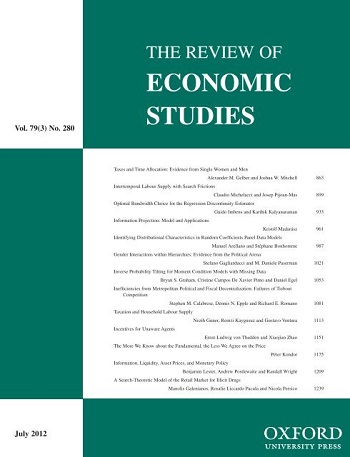
Equilibrium Analysis in Behavioral One-Sector Growth Models

Labs and Centers
Research news.

Study finds workers misjudge wage markets

Simon Jäger receives 2024 In_equality Research Award
Department of Economics

- Research Groups
Our faculty has structured the department to have strong coverage in applied microeconomics, econometrics, economic theory, finance, and macroeconomics. Within these areas, our faculty work on a wide range of topics in economics important to the country and the world. Some of our most impactful work focuses on:
- The US and global financing system
- How unemployment affects workers and the economy
- Causes and consequences of economic inequality and poverty
- Household economic choices and economic behavior
- The importance of game theory and political economy to understanding economic outcomes
By focusing on these five core areas, particularly at the graduate level, the department offers a unique, specific educational experience. Aside from traditional coursework, research, and special lectures (including the Distinguished Lectures in Economics and the Newcomb Lectures), the department holds three weekly seminars to encourage collaboration and communication within these five disciplines. The seminars attract top scholars from throughout the world to discuss their work and also provide a forum for faculty and students to present their recent research.
The department also has a set of weekly brown bag seminars where graduate students present their research to their fellow students and the faculty.
Research Highlights
Unemployment and the economy.
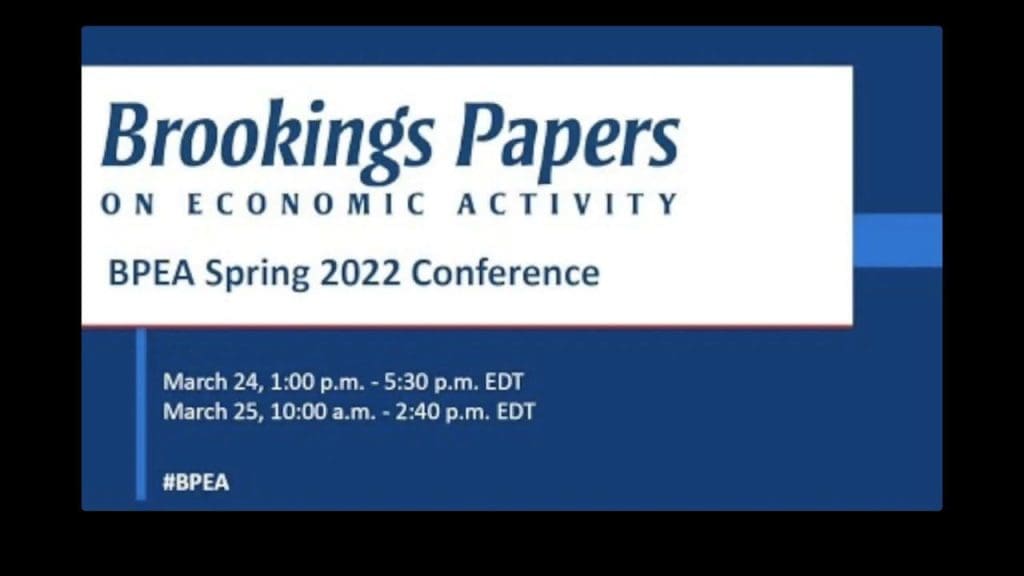
The Supplemental Expenditure Poverty Measure: A New Method for Measuring Poverty
Robert Moffitt and John Fitzgerald
Brookings Papers on Economic Activity
economic behavior
Hybrid decision model and the ranking of experiments.
Edi Karni and Zvi Safra
Journal of Mathematical Economics
Comparative Incompleteness: Measurement, Behavioral Manifestations and Elicitation
Edi Karni and Marie-Louise Vierø
Journal of Economic Behavior & Organization
U.S. and global financing system
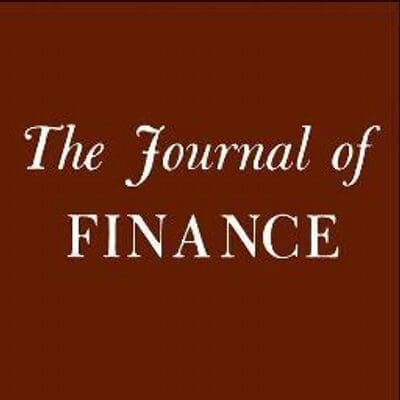
Due Diligence
Brendan Daley, Thomas Geelen, and Brett Green
The Journal of Finance
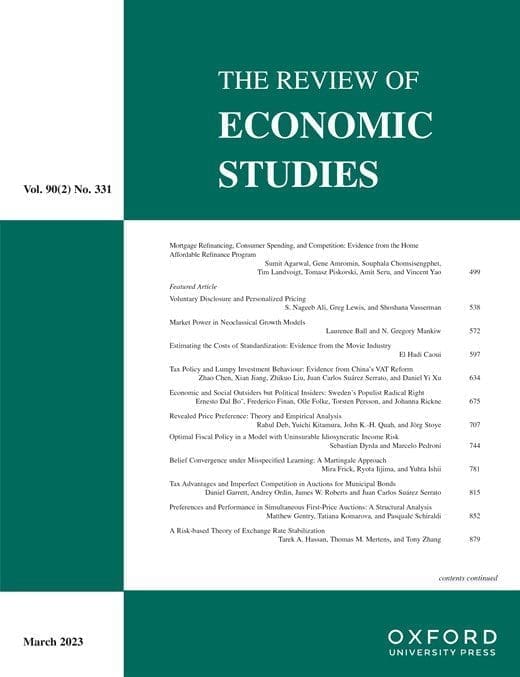
Market Power in Neoclassical Growth Models
Laurence Ball and Gregory Mankiw
The Review of Economic Studies
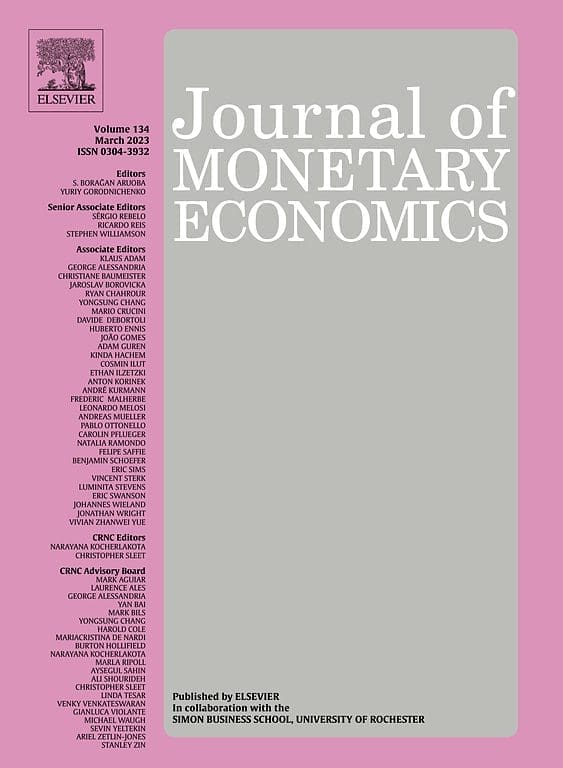
Threats to Central Bank Independence: High-Frequency Identification with Twitter
Francesco Bianchi, Roberto Gomez-Cram, Thilo Kind, and Howard Kung
Journal of Monetary Economics
Forthcoming
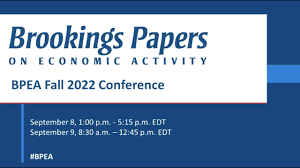
Understanding U.S. Inflation During the COVID Era
Laurence Ball, Daniel Leigh, and Prachi Mishra
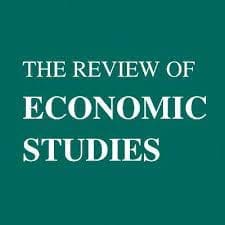
Diagnostic Business Cycles
Francesco Bianchi, Cosmin Ilut, and Hikaru Saijo
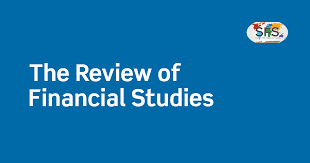
Designing Securities for Scrutiny
Brendan Daley, Brett Green, and Victoria Vanasco
The Review of Financial Studies
Belief Distortions and Macroeconomic Fluctuations
Francesco Bianchi, Sydney Ludvigson, and Sai Ma
American Economic Review
game theory and political economy
Centralized matching with incomplete information.
Marcelo Ariel Fernandez, Kirill Rudov, and Leeat Yariv
American Economic Review: Insights
Misclassification Errors In Labor Force Statuses and the Early Identification of Economic Recessions
Jiandong Sun, Shuaizhang Feng, and Yingyao Hu
Journal of Asian Economics
Missing Events in Event Studies: Identifying the Effects of Partially Measured News Surprises
Refet S. Gürkaynak, Burçin Kisacikoğlu, and Jonathan H. Wright
Revealed Preferences over Risk and Uncertainty
Matthew Polisson, John K.-H. Quah, and Ludovic Renou
economic inequality and poverty
Genetic endowments and wealth inequality.
Daniel Barth, Nicholas W. Papageorge, and Kevin Thom
Journal of Political Economy
Bargaining and News
Brendan Daley and Brett Green
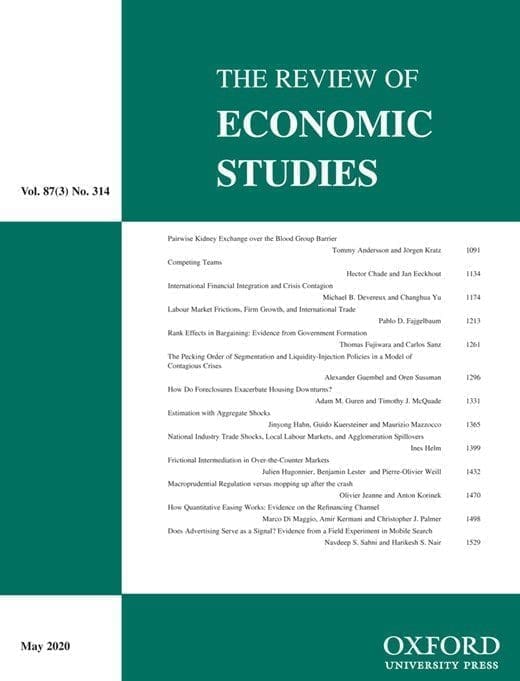
Macroprudential Regulation Versus Mopping Up After the Crash
Olivier Jeanne and Anton Korinek
A Mechanisms for Eliciting Second-Order Beliefs and the Inclination to Choose
American Economic Journal: Microeconomics
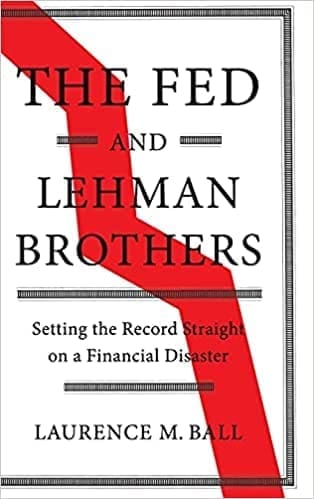

The Fed and Lehman Brothers: Setting the Record Straight on a Financial Disaster (book)
Laurence Ball
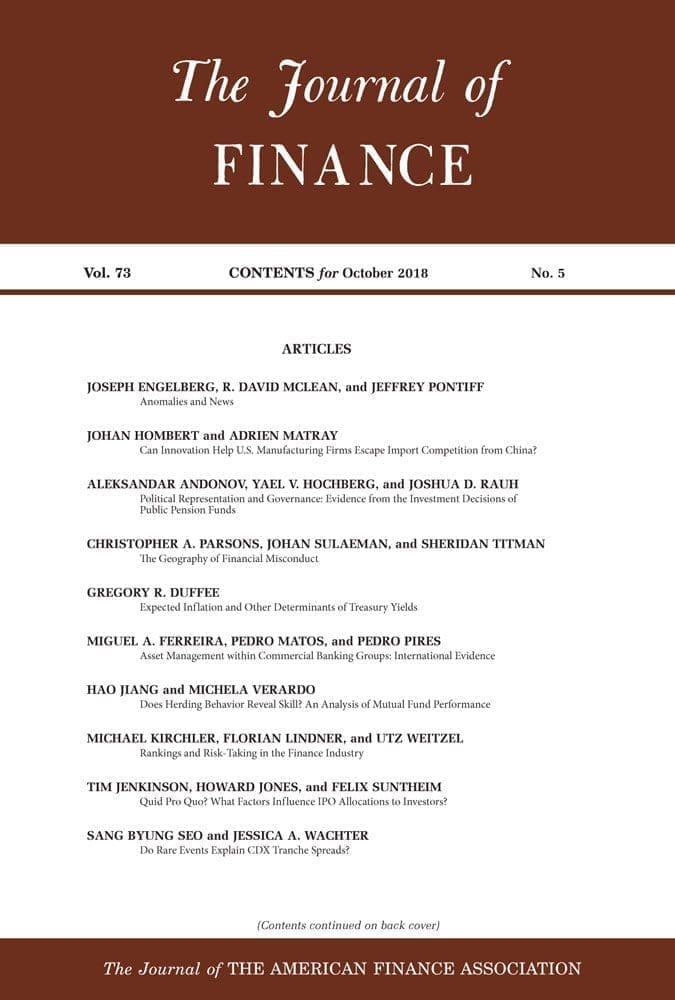
Expected Inflation and Other Determinants of Treasury Yields
Gregory R. Duffee
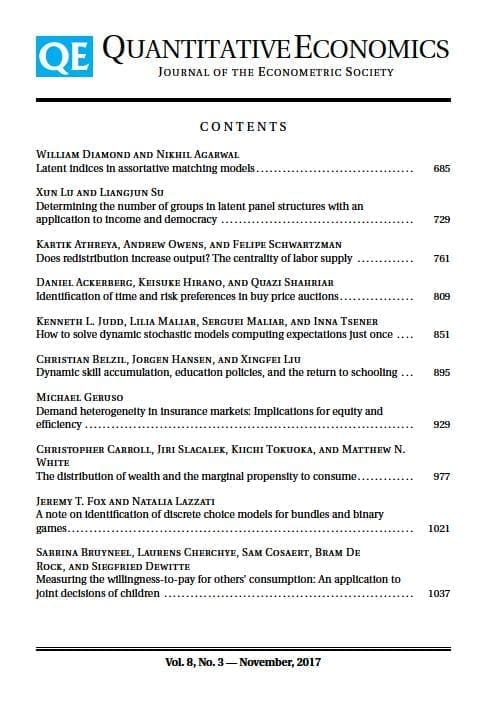
The Distribution of Wealth and the Marginal Propensity to Consume
Christopher Carroll, Jiri Slacalek, Kiichi Tokuoka, and Matthew N. White
Quantitative Economics
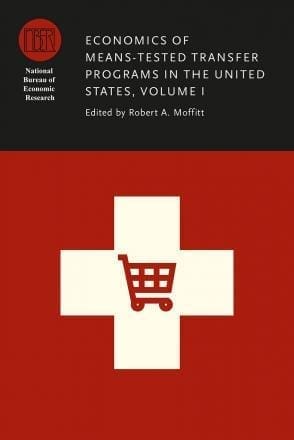
The Economics of Means-Tested Transfer Programs in the United States, Vol. 1 (book)
Robert Moffitt
Isolated Capital Cities, Accountability, and Corruption: Evidence from U.S. States
Filipe R. Campante and Quoc-Anh Do
Mandatory vs. Discretionary Spending: The Status Quo Effect
T. Renee Bowen, Ying Chen, and Hülya Eraslan
- About the New York Fed
- Bank Leadership
- Diversity and Inclusion
- Communities We Serve
- Board of Directors
- Disclosures
- Ethics and Conflicts of Interest
- Annual Financial Statements
- News & Events
- Advisory Groups
- Vendor Information
- Holiday Schedule
At the New York Fed, our mission is to make the U.S. economy stronger and the financial system more stable for all segments of society. We do this by executing monetary policy, providing financial services, supervising banks and conducting research and providing expertise on issues that impact the nation and communities we serve.

The New York Innovation Center bridges the worlds of finance, technology, and innovation and generates insights into high-value central bank-related opportunities.

Do you have a request for information and records? Learn how to submit it.

Learn about the history of the New York Fed and central banking in the United States through articles, speeches, photos and video.
- Markets & Policy Implementation
- Reference Rates
- Effective Federal Funds Rate
- Overnight Bank Funding Rate
- Secured Overnight Financing Rate
- SOFR Averages & Index
- Broad General Collateral Rate
- Tri-Party General Collateral Rate
- Desk Operations
- Treasury Securities
- Agency Mortgage-Backed Securities
- Reverse Repos
- Securities Lending
- Central Bank Liquidity Swaps
- System Open Market Account Holdings
- Primary Dealer Statistics
- Historical Transaction Data
- Monetary Policy Implementation
- Agency Commercial Mortgage-Backed Securities
- Agency Debt Securities
- Repos & Reverse Repos
- Discount Window
- Treasury Debt Auctions & Buybacks as Fiscal Agent
- INTERNATIONAL MARKET OPERATIONS
- Foreign Exchange
- Foreign Reserves Management
- Central Bank Swap Arrangements
- Statements & Operating Policies
- Survey of Primary Dealers
- Survey of Market Participants
- Annual Reports
- Primary Dealers
- Standing Repo Facility Counterparties
- Reverse Repo Counterparties
- Foreign Exchange Counterparties
- Foreign Reserves Management Counterparties
- Operational Readiness
- Central Bank & International Account Services
- Programs Archive
- Economic Research
- Consumer Expectations & Behavior
- Survey of Consumer Expectations
- Household Debt & Credit Report
- Home Price Changes
- Growth & Inflation
- Equitable Growth Indicators
- Multivariate Core Trend Inflation
- New York Fed DSGE Model
- New York Fed Staff Nowcast
- R-star: Natural Rate of Interest
- Labor Market
- Labor Market for Recent College Graduates
- Financial Stability
- Corporate Bond Market Distress Index
- Outlook-at-Risk
- Treasury Term Premia
- Yield Curve as a Leading Indicator
- Banking Research Data Sets
- Quarterly Trends for Consolidated U.S. Banking Organizations
- Empire State Manufacturing Survey
- Business Leaders Survey
- Supplemental Survey Report
- Regional Employment Trends
- Early Benchmarked Employment Data
- INTERNATIONAL ECONOMY
- Global Economic Indicators
- Global Supply Chain Pressure Index
- Staff Economists
- Visiting Scholars
- Resident Scholars
- PUBLICATIONS
- Liberty Street Economics
- Staff Reports
- Economic Policy Review
- RESEARCH CENTERS
- Applied Macroeconomics & Econometrics Center (AMEC)
- Center for Microeconomic Data (CMD)
- Economic Indicators Calendar
- Financial Institution Supervision
- Regulations
- Reporting Forms
- Correspondence
- Bank Applications
- Community Reinvestment Act Exams
- Frauds and Scams
As part of our core mission, we supervise and regulate financial institutions in the Second District. Our primary objective is to maintain a safe and competitive U.S. and global banking system.

The Governance & Culture Reform hub is designed to foster discussion about corporate governance and the reform of culture and behavior in the financial services industry.

Need to file a report with the New York Fed? Here are all of the forms, instructions and other information related to regulatory and statistical reporting in one spot.

The New York Fed works to protect consumers as well as provides information and resources on how to avoid and report specific scams.
- Financial Services & Infrastructure
- Services For Financial Institutions
- Payment Services
- Payment System Oversight
- International Services, Seminars & Training
- Tri-Party Repo Infrastructure Reform
- Managing Foreign Exchange
- Money Market Funds
- Over-The-Counter Derivatives
The Federal Reserve Bank of New York works to promote sound and well-functioning financial systems and markets through its provision of industry and payment services, advancement of infrastructure reform in key markets and training and educational support to international institutions.

The New York Fed offers the Central Banking Seminar and several specialized courses for central bankers and financial supervisors.

The New York Fed has been working with tri-party repo market participants to make changes to improve the resiliency of the market to financial stress.
- Community Development & Education
- Household Financial Well-being
- Fed Communities
- Fed Listens
- Fed Small Business
- Workforce Development
- Other Community Development Work
- High School Fed Challenge
- College Fed Challenge
- Teacher Professional Development
- Classroom Visits
- Museum & Learning Center Visits
- Educational Comic Books
- Economist Spotlight Series
- Lesson Plans and Resources
- Economic Education Calendar

We are connecting emerging solutions with funding in three areas—health, household financial stability, and climate—to improve life for underserved communities. Learn more by reading our strategy.

The Economic Inequality & Equitable Growth hub is a collection of research, analysis and convenings to help better understand economic inequality.

- Request a Speaker
- International Seminars & Training
- Governance & Culture Reform
- Data Visualization
- Economic Research Tracker
- Markets Data APIs
- Terms of Use

This website uses cookies.
By clicking the "Accept" button or continuing to browse our site, you agree to first-party and session-only cookies being stored on your device to enhance site navigation and analyze site performance and traffic. For more information on our use of cookies, please see our Privacy Policy .
Journal of Economic Literature
Current issue, find articles in this journal.
The pace of economics publishing
Daniel Hamermesh discusses publishing in economics and how to speed it up.
Forthcoming Articles
View articles accepted for publication in JEL .
Editors and contacts at the Journal of Economic Literature .
50 Best Finance Dissertation Topics For Research Students
Link Copied
Share on Facebook
Share on Twitter
Share on LinkedIn

Finance Dissertation Made Easier!
Embarking on your dissertation adventure? Look no further! Choosing the right finance dissertation topics is like laying the foundation for your research journey in Finance, and we're here to light up your path. In this blog, we're diving deep into why dissertation topics in finance matter so much. We've got some golden writing tips to share with you! We're also unveiling the secret recipe for structuring a stellar finance dissertation and exploring intriguing topics across various finance sub-fields. Whether you're captivated by cryptocurrency, risk management strategies, or exploring the wonders of Internet banking, microfinance, retail and commercial banking - our buffet of Finance dissertation topics will surely set your research spirit on fire!
What is a Finance Dissertation?
Finance dissertations are academic papers that delve into specific finance topics chosen by students, covering areas such as stock markets, banking, risk management, and healthcare finance. These dissertations require extensive research to create a compelling report and contribute to the student's confidence and satisfaction in the field of Finance. Now, let's understand why these dissertations are so important and why choosing the right Finance dissertation topics is crucial!
Why Are Finance Dissertation Topics Important?
Choosing the dissertation topics for Finance students is essential as it will influence the course of your research. It determines the direction and scope of your study. You must make sure that the Finance dissertation topics you choose are relevant to your field of interest, or you may end up finding it more challenging to write. Here are a few reasons why finance thesis topics are important:
1. Relevance
Opting for relevant finance thesis topics ensures that your research contributes to the existing body of knowledge and addresses contemporary issues in the field of Finance. Choosing a dissertation topic in Finance that is relevant to the industry can make a meaningful impact and advance understanding in your chosen area.
2. Personal Interest
Selecting Finance dissertation topics that align with your interests and career goals is vital. When genuinely passionate about your research area, you are more likely to stay motivated during the dissertation process. Your interest will drive you to explore the subject thoroughly and produce high-quality work.
3. Future Opportunities
Well-chosen Finance dissertation topics can open doors to various future opportunities. It can enhance your employability by showcasing your expertise in a specific finance area. It may lead to potential research collaborations and invitations to conferences in your field of interest.
4. Academic Supervision
Your choice of topics for dissertation in Finance also influences the availability of academic supervisors with expertise in your chosen area. Selecting a well-defined research area increases the likelihood of finding a supervisor to guide you effectively throughout the dissertation. Their knowledge and guidance will greatly contribute to the success of your research.
Writing Tips for Finance Dissertation
A lot of planning, formatting, and structuring goes into writing a dissertation. It starts with deciding on topics for a dissertation in Finance and conducting tons of research, deciding on methods, and so on. However, you can navigate the process more effectively with proper planning and organisation. Below are some tips to assist you along the way, and here is a blog on the 10 tips on writing a dissertation that can give you more information, should you need it!
1. Select a Manageable Topic
Choosing Finance research topics within the given timeframe and resources is important. Select a research area that interests you and aligns with your career goals. It will help you stay inspired throughout the dissertation process.
2. Conduct a Thorough Literature Review
A comprehensive literature review forms the backbone of your research. After choosing the Finance dissertation topics, dive deep into academic papers, books, and industry reports, gaining a solid understanding of your chosen area to identify research gaps and establish the significance of your study.
3. Define Clear Research Objectives
Clearly define your dissertation's research questions and objectives. It will provide a clear direction for your research and guide your data collection, analysis, and overall structure. Ensure your objectives are specific, measurable, achievable, relevant, and time-bound (SMART).
4. Collect and Analyse Data
Depending on your research methodology and your Finance dissertation topics, collect and analyze relevant data to support your findings. It may involve conducting surveys, interviews, experiments, and analyzing existing datasets. Choose appropriate statistical techniques and qualitative methods to derive meaningful insights from your data.
5. Structure and Organization
Pay attention to the structure and organization of your dissertation. Follow a logical progression of chapters and sections, ensuring that each chapter contributes to the overall coherence of your study. Use headings, subheadings, and clear signposts to guide the reader through your work.
6. Proofread and Edit
Once you have completed the writing process, take the time to proofread and edit your dissertation carefully. Check for clarity, coherence, and proper grammar. Ensure that your arguments are well-supported, and eliminate any inconsistencies or repetitions. Pay attention to formatting, citation styles, and consistency in referencing throughout your dissertation.
Don't let student accommodation hassles derail your finance research.
Book through amber today!
Finance Dissertation Topics
Now that you know what a finance dissertation is and why they are important, it's time to have a look at some of the best Finance dissertation topics. For your convenience, we have segregated these topics into categories, including cryptocurrency, risk management, internet banking, and so many more. So, let's dive right in and explore the best Finance dissertation topics:
Dissertation topics in Finance related to Cryptocurrency
1. The Impact of Regulatory Frameworks on the Volatility and Liquidity of Cryptocurrencies.
2. Exploring the Factors Influencing Cryptocurrency Adoption: A Comparative Study.
3. Assessing the Efficiency and Market Integration of Cryptocurrency Exchanges.
4. An Analysis of the Relationship between Cryptocurrency Prices and Macroeconomic Factors.
5. The Role of Initial Coin Offerings (ICOs) in Financing Startups: Opportunities and Challenges.
Dissertation topics in Finance related to Risk Management
1. The Effectiveness of Different Risk Management Strategies in Mitigating Financial Risks in Banking Institutions.
2. The Role of Derivatives in Hedging Financial Risks: A Comparative Study.
3. Analyzing the Impact of Risk Management Practices on Firm Performance: A Case Study of a Specific Industry.
4. The Use of Stress Testing in Evaluating Systemic Risk: Lessons from the Global Financial Crisis.
5. Assessing the Relationship between Corporate Governance and Risk Management in Financial Institutions.
Dissertation topics in Finance related to Internet Banking
1. Customer Adoption of Internet Banking: An Empirical Study on Factors Influencing Usage.
Enhancing Security in Internet Banking: Exploring Biometric Authentication Technologies.
2. The Impact of Mobile Banking Applications on Customer Engagement and Satisfaction.
3. Evaluating the Efficiency and Effectiveness of Internet Banking Services in Emerging Markets.
4. The Role of Social Media in Shaping Customer Perception and Adoption of Internet Banking.
Dissertation topics in Finance related to Microfinance
1. The Impact of Microfinance on Poverty Alleviation: A Comparative Study of Different Models.
2. Exploring the Role of Microfinance in Empowering Women Entrepreneurs.
3. Assessing the Financial Sustainability of Microfinance Institutions in Developing Countries.
4. The Effectiveness of Microfinance in Promoting Rural Development: Evidence from a Specific Region.
5. Analyzing the Relationship between Microfinance and Entrepreneurial Success: A Longitudinal Study.
Dissertation topics in Finance related to Retail and Commercial Banking
1. The Impact of Digital Transformation on Retail and Commercial Banking: A Case Study of a Specific Bank.
2. Customer Satisfaction and Loyalty in Retail Banking: An Analysis of Service Quality Dimensions.
3. Analyzing the Relationship between Bank Branch Expansion and Financial Performance.
4. The Role of Fintech Startups in Disrupting Retail and Commercial Banking: Opportunities and Challenges.
5. Assessing the Impact of Mergers and Acquisitions on the Performance of Retail and Commercial Banks.
Dissertation topics in Finance related to Alternative Investment
1. The Performance and Risk Characteristics of Hedge Funds: A Comparative Analysis.
2. Exploring the Role of Private Equity in Financing and Growing Small and Medium-Sized Enterprises.
3. Analyzing the Relationship between Real Estate Investments and Portfolio Diversification.
4. The Potential of Impact Investing: Evaluating the Social and Financial Returns.
5. Assessing the Risk-Return Tradeoff in Cryptocurrency Investments: A Comparative Study.
Dissertation topics in Finance related to International Affairs
1. The Impact of Exchange Rate Volatility on International Trade: A Case Study of a Specific Industry.
2. Analyzing the Effectiveness of Capital Controls in Managing Financial Crises: Comparative Study of Different Countries.
3. The Role of International Financial Institutions in Promoting Economic Development in Developing Countries.
4. Evaluating the Implications of Trade Wars on Global Financial Markets.
5. Assessing the Role of Central Banks in Managing Financial Stability in a Globalized Economy.
Dissertation topics in Finance related to Sustainable Finance
1. The impact of sustainable investing on financial performance.
2. The role of green bonds in financing climate change mitigation and adaptation.
3. The development of carbon markets.
4. The use of environmental, social, and governance (ESG) factors in investment decision-making.
5. The challenges and opportunities of sustainable Finance in emerging markets.
Dissertation topics in Finance related to Investment Banking
1. The valuation of distressed assets.
2. The pricing of derivatives.
3. The risk management of financial institutions.
4. The regulation of investment banks.
5. The impact of technology on the investment banking industry.
Dissertation topics in Finance related to Actuarial Science
1. The development of new actuarial models for pricing insurance products.
2. The use of big data in actuarial analysis.
3. The impact of climate change on insurance risk.
4. The design of pension plans that are sustainable in the long term.
5. The use of actuarial science to manage risk in other industries, such as healthcare and Finance.
Tips To Find Good Finance Dissertation Topics
Embarking on a financial dissertation journey requires careful consideration of various factors. Your choice of topic in finance research topics is pivotal, as it sets the stage for the entire research process. Finding a good financial dissertation topic is essential to blend your interests with the current trends in the financial landscape. We suggest the following tips that can help you pick the perfect dissertation topic:
1. Identify your interests and strengths
2. Check for current relevance
3. Feedback from your superiors
4. Finalise the research methods
5. Gather the data
6. Work on the outline of your dissertation
7. Make a draft and proofread it
In this blog, we have discussed the importance of finance thesis topics and provided valuable writing tips and tips for finding the right topic, too. We have also presented a list of topics within various subfields of Finance. With this, we hope you have great ideas for finance dissertations. Good luck with your finance research journey!
Frequently Asked Questions
How do i research for my dissertation project topics in finance, what is the best topic for dissertation topics for mba finance, what is the hardest finance topic, how do i choose the right topic for my dissertation in finance, where can i find a dissertation topic in finance.
Your ideal student home & a flight ticket awaits
Follow us on :

Related Posts

Top 10 Branches of Philosophy: Meta Physics, Epistiomology & More

10 Best Healthcare Courses in the UK: Your Path to a Rewarding Career!
.jpg)
The University Of Queensland: Eligibility, Ranking, And All

Planning to Study Abroad ?

Your ideal student accommodation is a few steps away! Please fill in your details below so we can find you a new home!
We have got your response

amber © 2024. All rights reserved.
4.8/5 on Trustpilot
Rated as "Excellent" • 4800+ Reviews by students
Rated as "Excellent" • 4800+ Reviews by Students
Accounting and Finance Thesis Topics

This page provides a comprehensive list of accounting and finance thesis topics designed to assist students in selecting an impactful subject for their thesis. Whether you are pursuing undergraduate, graduate, or postgraduate studies, the diverse array of topics presented here covers a broad spectrum of specialties within the field of accounting and finance. From traditional areas like audit and taxation to emerging fields like fintech and behavioral finance, this collection aims to cater to a variety of research interests and academic requirements. Each category is meticulously curated to inspire innovative thinking and encourage a deeper exploration of both established and contemporary issues in the discipline.
600 Accounting and Finance Thesis Topics

Academic Writing, Editing, Proofreading, And Problem Solving Services
Get 10% off with 24start discount code, browse accounting and finance thesis topics:.
- Accounting Thesis Topics
- Audit Thesis Topics
- Banking Thesis Topics
- Behavioral Finance Thesis Topics
- Capital Markets Thesis Topics
- Corporate Finance Thesis Topics
- Corporate Governance Thesis Topics
- Finance Thesis Topics
- Financial Economics Thesis Topics
- Financial Management Thesis Topics
- Fintech Thesis Topics
- Insurance Thesis Topics
- International Finance Thesis Topics
- Investment Thesis Topics
- Management Accounting Thesis Topics
- Personal Finance Thesis Topics
- Public Finance Thesis Topics
- Quantitative Finance Thesis Topics
- Risk Management Thesis Topics
- Taxation Thesis Topics
1. Accounting Thesis Topics
- The impact of artificial intelligence on financial reporting and compliance.
- Blockchain technology in accounting: disrupting traditional processes.
- The role of ethical leadership in promoting sustainable accounting practices.
- Comparative analysis of global accounting standards post-IFRS adoption.
- Cultural influences on multinational accounting practices.
- The future of green accounting in corporate sustainability initiatives.
- Digital currencies and their accounting implications within multinational corporations.
- The efficacy of automated accounting systems in small to medium enterprises.
- Forensic accounting as a tool against cyber financial fraud.
- Tax strategy and accounting ethics in the digital age.
- Non-profit accounting challenges in a post-pandemic world.
- Gig economy impacts on financial reporting and tax obligations.
- Continuous auditing in real-time financial data environments.
- Ethical conflicts in accounting decisions: a case study analysis.
- The integration of blockchain for transparency in financial auditing.
- Strategic management accounting techniques in agile organizations.
- Predictive analytics in accounting and its impact on business strategy.
- Cost management innovations in healthcare accounting.
- Regulatory impacts on financial disclosures and corporate accounting.
- Innovative financial planning tools for startup sustainability.
- The role of environmental, social, and governance (ESG) criteria in financial decision-making.
- Public sector accountability and accounting reforms.
- Big data analytics in financial statement analysis.
- Adapting accounting frameworks for emerging markets.
- The dynamics of accounting professionalism and ethical standards.
- Real-time financial reporting: challenges and advantages.
- Mergers and acquisitions: accounting for corporate restructuring.
- Artificial intelligence in audit operations: reshaping traditional frameworks.
- Corporate sustainability reporting: critical analysis of current practices.
- Tax evasion strategies and their impact on international accounting standards.
2. Audit Thesis Topics
- The effectiveness of continuous auditing in detecting and preventing fraud.
- Implementing a risk-based auditing framework in emerging markets.
- Enhancing corporate governance with robust audit committee functions.
- The comparative reliability of external audits versus internal controls.
- The impact of the latest regulatory frameworks on auditing standards.
- Ensuring auditor independence in a complex corporate milieu.
- Blockchain applications in enhancing audit trail transparency.
- Strategies for cybersecurity audits in financial institutions.
- Cultural impacts on audit practices in global organizations.
- The future of auditing: integrating real-time data analytics.
- The relationship between audit quality and investment decisions.
- Leveraging machine learning for enhanced audit precision.
- Auditing ethics in the face of financial technology innovations.
- The role of internal audits in reinforcing cybersecurity measures.
- Auditing challenges in decentralized platforms using blockchain technology.
- Comparative study of traditional and modern audit methodologies.
- The impact of data privacy regulations on audit practices globally.
- Developing effective audit strategies for cloud-based accounting systems.
- The role of audits in enhancing business resilience during economic downturns.
- Fraud detection techniques in an AI-driven audit environment.
- The effectiveness of environmental auditing in promoting corporate sustainability.
- Auditing for non-financial information: challenges and methodologies.
- Enhancing the transparency of public sector audits to improve trust.
- Implementing forensic auditing techniques in corporate fraud detection.
- The evolution of auditing standards in response to global financial crises.
- The role of technology in transforming audit documentation and reporting.
- Impact of auditor-client relationships on audit quality.
- Strategies for overcoming challenges in cross-border audit practices.
- Auditing supply chain operations for financial integrity and sustainability.
- The future of regulatory audits in a dynamically changing global market.
3. Banking Thesis Topics
- The future of digital banking post-COVID-19.
- Analyzing the impact of blockchain technology on international banking transactions.
- The role of central banks in managing digital currency implementations.
- Sustainable banking practices: integrating ESG factors into bank operations.
- The evolution of consumer banking behavior influenced by mobile technologies.
- Cybersecurity strategies in banking: preventing breaches in a digital age.
- The effectiveness of monetary policy in digital banking ecosystems.
- Banking regulations and their impact on global economic stability.
- Fintech innovations and their integration into traditional banking systems.
- The impact of banking deserts on rural economic development.
- Artificial intelligence in banking: reshaping customer service and risk management.
- The role of ethical banking in promoting financial inclusion.
- Impact of Brexit on UK banking: challenges and opportunities.
- Stress testing in banks: approaches and implications for financial stability.
- Consumer data protection in online banking: challenges and solutions.
- The influence of microfinancing on developing economies.
- The impact of interest rate changes on banking profitability.
- Role of banking in supporting sustainable energy financing.
- Technological disruptions in banking: a threat or an opportunity?
- The effect of global banking regulations on emerging market economies.
- Strategies for managing credit risk in post-pandemic recovery phases.
- The growing role of Islamic banking in the global finance sector.
- The impact of non-traditional banking platforms on financial services.
- Data analytics in banking: enhancing decision-making processes.
- Cross-border banking challenges in a globalized economy.
- The future of branchless banking: implications for customer engagement.
- Banking transparency and its effects on consumer trust.
- The role of banks in facilitating international trade.
- Innovations in mortgage banking and their impact on housing markets.
- The effects of banking consolidation on competition and service delivery.
4. Behavioral Finance Thesis Topics
- The psychological effects of financial losses on investment behavior.
- Behavioral biases in financial decision-making: a case study of stock market investors.
- The impact of social media on investor behavior and market outcomes.
- Cognitive dissonance and its effect on personal financial planning.
- The role of emotional intelligence in financial trading success.
- Exploring the herding behavior in cryptocurrency markets.
- Behavioral finance strategies to mitigate impulse spending.
- The influence of cultural factors on investment decisions.
- Psychological factors driving risk tolerance among millennials.
- The effect of behavioral finance education on individual investment choices.
- Overconfidence and trading: an analysis of its impact on stock returns.
- Decision-making processes under financial stress: a behavioral perspective.
- The role of behavioral factors in the success of financial advisement.
- The impact of behavioral insights on retirement savings plans.
- Anchoring bias in financial forecasting and market predictions.
- The role of optimism and pessimism in financial markets.
- Behavioral finance and its role in shaping sustainable investing.
- Understanding the gap between perceived and actual financial knowledge.
- Behavioral interventions to improve financial literacy.
- The influence of personality traits on financial decision-making.
- Behavioral economics: redesigning financial products for better decision outcomes.
- The effectiveness of nudge theory in personal finance management.
- The impact of financial anxiety on decision-making efficiency.
- The behavioral aspects of financial negotiation.
- Market sentiment analysis: behavioral finance in algorithmic trading.
- The psychological impact of financial news on market movements.
- Behavioral finance insights into crowd-funding behaviors.
- Ethical considerations in behavioral finance research.
- The influence of age and life stage on financial risk-taking.
- Behavioral finance in corporate decision-making: case studies of strategic financial planning.
5. Capital Markets Thesis Topics
- The future trajectory of global capital markets in the post-pandemic era.
- Impact of quantitative easing on emerging market economies.
- The role of technology in enhancing liquidity in capital markets.
- Analysis of market efficiency in different economic cycles.
- The effects of political instability on capital market performance.
- Environmental, Social, and Governance (ESG) criteria and their impact on capital market trends.
- Cryptocurrency as an emerging asset class in capital markets.
- The role of sovereign wealth funds in global capital markets.
- Algorithmic trading and its influence on market dynamics.
- The impact of international sanctions on capital markets.
- High-frequency trading: market benefits and systemic risks.
- The role of capital markets in financing green energy initiatives.
- Impact of fintech on traditional capital market structures.
- Corporate bond markets and their responsiveness to economic changes.
- The influence of central bank policies on capital market stability.
- Market anomalies and behavioral economics: exploring the deviations from market efficiency.
- The role of investor sentiment in capital market fluctuations.
- Crowdfunding as an alternative financing mechanism in capital markets.
- Regulatory challenges facing capital markets in developing countries.
- The future of securitization post-global financial crisis.
- Derivatives markets and their role in risk management.
- The impact of technology IPOs on market perceptions.
- Venture capital and its influence on market innovation.
- Corporate governance and its effect on equity prices.
- The role of market makers in maintaining market stability.
- Ethical investing and its traction in the capital market.
- The impact of demographic shifts on investment trends.
- The interplay between macroeconomic policies and capital market growth.
- Leveraging machine learning for capital market predictions.
- The role of media in shaping public perceptions of capital markets.
6. Corporate Finance Thesis Topics
- The impact of global economic shifts on corporate financing strategies.
- Analyzing the role of corporate finance in driving sustainable business practices.
- The influence of digital transformation on corporate financial management.
- Risk management in corporate finance during uncertain economic times.
- The effects of corporate financial restructuring on shareholder value.
- Financing innovation: How corporations fund new technology investments.
- The role of private equity in corporate finance.
- Strategies for managing corporate debt in a fluctuating interest rate environment.
- Impact of mergers and acquisitions on corporate financial health.
- ESG (Environmental, Social, and Governance) factors in corporate finance decisions.
- The future of corporate finance in the era of blockchain and cryptocurrencies.
- The role of financial analytics in optimizing corporate investment decisions.
- Corporate finance challenges in emerging markets.
- Venture capital and its impact on corporate growth.
- Corporate financial transparency and its effect on investor relations.
- The role of CFOs in navigating new global tax laws.
- Financial technology innovations and their implications for corporate finance.
- The impact of international trade agreements on corporate financing.
- Corporate finance strategies in the healthcare sector.
- The influence of shareholder activism on corporate financial policies.
- The future of corporate banking relationships.
- Capital allocation decisions in multinational corporations.
- The role of artificial intelligence in financial forecasting and budgeting.
- The impact of demographic changes on corporate finance strategies.
- Managing financial risks associated with climate change.
- The role of corporate finance in business model innovation.
- Financing strategies for startups versus established firms.
- The effect of corporate culture on financial decision-making.
- Corporate governance and its influence on financial risk management.
- The evolving landscape of securities regulations and its impact on corporate finance.
7. Corporate Governance Thesis Topics
- The impact of governance structures on corporate sustainability and responsibility.
- Board diversity and its effect on corporate decision-making processes.
- Corporate governance mechanisms to combat corruption and enhance transparency.
- The role of stakeholder engagement in shaping governance practices.
- Analyzing the effectiveness of corporate governance codes across different jurisdictions.
- The influence of technology on corporate governance practices.
- Governance challenges in family-owned businesses.
- The impact of corporate governance on firm performance during economic crises.
- Shareholder rights and their enforcement in emerging market economies.
- The future of corporate governance in the digital economy.
- The role of ethics in corporate governance.
- Corporate governance and risk management: interlinkages and impacts.
- The effects of regulatory changes on corporate governance standards.
- ESG integration in corporate governance.
- The role of internal audits in strengthening corporate governance.
- Corporate governance in non-profit organizations.
- The influence of activist investors on corporate governance reforms.
- The effectiveness of whistleblower policies in corporate governance.
- Cybersecurity governance in large corporations.
- Succession planning and governance in large enterprises.
- The impact of international governance standards on local practices.
- The role of governance in preventing financial fraud.
- Corporate governance in the fintech industry.
- The relationship between corporate governance and corporate social responsibility.
- The impact of global economic policies on corporate governance.
- Data privacy and security: Governance challenges in the information era.
- The role of governance in managing corporate crises.
- The impact of leadership styles on corporate governance effectiveness.
- Corporate governance and its role in enhancing business competitiveness.
- The evolving role of board committees in strategic decision-making.
8. Finance Thesis Topics
- Financial implications of global climate change initiatives.
- The future of financial markets in the face of geopolitical uncertainties.
- The impact of microfinance on poverty alleviation in developing countries.
- Cryptocurrency: emerging financial technology and its regulatory challenges.
- The role of financial institutions in fostering economic resilience.
- Innovations in financial products for an aging global population.
- The impact of digital wallets on traditional banking systems.
- Financial literacy and its role in promoting socio-economic equality.
- The effect of fintech on the global remittance landscape.
- Risk management strategies in finance post-global financial crisis.
- The influence of behavioral finance on investment strategies.
- The evolving role of central banks in digital currency markets.
- Financing sustainable urban development.
- The impact of artificial intelligence on personal finance management.
- Peer-to-peer lending and its effect on traditional credit markets.
- The role of finance in facilitating international trade and development.
- The implications of Brexit on European financial markets.
- Financial derivatives and their role in modern economies.
- The effects of sanctions on financial transactions and economic stability.
- The future of investment banking in a technology-driven world.
- Financial models for predicting economic downturns.
- The impact of financial education on consumer behavior.
- Securitization of assets: benefits and risks.
- The role of financial services in disaster recovery and resilience.
- Emerging trends in global investment patterns.
- Financial strategies for managing corporate mergers and acquisitions.
- The influence of cultural factors on financial systems and practices.
- The effectiveness of financial sanctions as a geopolitical tool.
- The future of financial privacy in an interconnected world.
- The role of finance in promoting renewable energy investments.
9. Financial Economics Thesis Topics
- The economic impact of quantitative easing in developed versus emerging markets.
- The implications of negative interest rates for global economies.
- Economic predictors of financial market behavior in crisis periods.
- The relationship between government debt and economic growth.
- Economic consequences of income inequality on national financial stability.
- The effects of consumer confidence on economic recovery.
- The role of economic policy in shaping housing market dynamics.
- The impact of global trade wars on financial economics.
- The influence of demographic shifts on economic policy and financial markets.
- Macroeconomic factors influencing cryptocurrency adoption.
- The role of economic theory in developing financial regulation.
- The impact of tourism economics on national financial health.
- Economic strategies for combating hyperinflation.
- The role of sovereign wealth funds in global economic stability.
- Economic analyses of environmental and resource economics.
- The implications of fintech on traditional economic models.
- Economic impacts of global pandemic responses by governments.
- The future of labor markets in a digitally transforming economy.
- Economic considerations in renewable energy finance.
- The economics of privacy and data security in financial transactions.
- The role of international economic organizations in financial regulation.
- Economic effects of technological innovation on traditional industries.
- The impact of economic sanctions on international relations and finance.
- The role of consumer spending in economic recovery phases.
- Economic policies for addressing wealth gaps.
- The economic impact of climate change on financial sectors.
- The role of economic research in crafting sustainable development goals.
- The economics of health and its impact on national economies.
- Global economic trends and their implications for financial forecasting.
- The relationship between educational economics and workforce development.
10. Financial Management Thesis Topics
- The strategic role of financial management in corporate sustainability.
- Impact of global financial regulations on corporate financial management.
- Financial management techniques for optimizing supply chain operations.
- The role of financial management in crisis recovery and resilience.
- Emerging technologies in financial management systems.
- The impact of corporate social responsibility on financial management strategies.
- Financial planning for long-term business growth in volatile markets.
- The influence of global economic conditions on financial management practices.
- Financial management challenges in the nonprofit sector.
- The role of financial management in mergers and acquisitions.
- The impact of digital currencies on corporate financial management.
- Financial risk management strategies in an era of global uncertainty.
- The role of financial management in enhancing operational efficiency.
- Financial management best practices in the tech industry.
- The impact of consumer behavior trends on financial management.
- Financial management in the healthcare sector: Challenges and strategies.
- The influence of artificial intelligence on financial decision-making processes.
- Financial management strategies for small and medium-sized enterprises (SMEs).
- The role of financial management in international expansion.
- Ethical considerations in financial management practices.
- Financial management in the energy sector: challenges and innovations.
- Financial strategies for managing environmental risks.
- The role of financial management in startup success and sustainability.
- The impact of financial transparency on corporate governance.
- Financial management and investor relations: integrating strategic communication.
- The role of financial management in educational institutions.
- Managing financial instability in emerging markets.
- Financial management practices in the gig economy.
- The role of financial managers in driving business model innovations.
- Financial management tools for effective capital allocation.
11. Fintech Thesis Topics
- The impact of blockchain on global payment systems.
- Regulation challenges for fintech innovations: A cross-country analysis.
- The role of fintech in democratizing access to financial services.
- Machine learning and artificial intelligence in predictive financial modeling.
- The evolution of peer-to-peer lending platforms and their impact on traditional banking.
- Cryptocurrency adoption: consumer behavior and market dynamics.
- The future of robo-advisors in personal finance management.
- The impact of mobile banking on financial inclusion in developing countries.
- Fintech solutions for microfinance: scalability and sustainability issues.
- Data privacy and security challenges in fintech applications.
- The role of fintech in enhancing cybersecurity in financial transactions.
- The impact of fintech on traditional banking employment.
- Regulatory technology (RegTech) for compliance management: trends and challenges.
- Fintech and its role in combating financial crime and money laundering.
- The influence of fintech on the insurance industry: insurtech innovations.
- Fintech investments: market trends and future prospects.
- The role of big data analytics in fintech.
- Digital wallets and the future of consumer spending behavior.
- Impact of fintech on wealth management and investment strategies.
- Challenges and opportunities of implementing distributed ledger technology in financial services.
- Consumer trust and fintech: building relationships in a digital age.
- The evolution of payment gateways: fintech at the forefront.
- Fintech’s impact on cross-border payments and remittances.
- The role of fintech in the development of smart contracts.
- The influence of fintech on financial market transparency.
- Fintech as a driver for financial sector innovation in emerging markets.
- The impact of artificial intelligence on risk assessment in fintech.
- Fintech and financial stability: an analysis of systemic risks.
- The role of fintech in streamlining government and public sector finance.
- Ethical considerations in fintech: balancing innovation with consumer protection.
12. Insurance Thesis Topics
- The future of insurance in the age of climate change.
- The impact of artificial intelligence on underwriting and risk management.
- Cyber risk insurance: emerging challenges and opportunities.
- The role of insurance in managing public health crises.
- Innovations in health insurance: technology-driven approaches to coverage.
- The evolution of automotive insurance in the era of autonomous vehicles.
- Insurance fraud detection using big data analytics.
- Regulatory challenges in the global insurance market.
- The influence of behavioral economics on insurance product design.
- The role of reinsurance in stabilizing insurance markets.
- Insurance and financial inclusion: strategies for reaching underserved communities.
- The impact of technological advancements on insurance pricing models.
- The role of insurance in disaster risk reduction and management.
- Customer data management in the insurance industry: privacy versus personalization.
- The future of life insurance: adapting to demographic shifts.
- The integration of IoT devices in home insurance policies.
- Blockchain applications in the insurance industry.
- The impact of social media on insurance marketing and customer engagement.
- Insurance as a tool for sustainable business practices.
- The role of insurance companies in promoting corporate social responsibility.
- The challenges of health insurance in a post-pandemic world.
- Emerging risks and insurance: addressing the needs of the gig economy.
- The role of insurance in mitigating financial risks associated with sports and entertainment.
- Ethical challenges in insurance: discrimination in risk assessment.
- The impact of global political instability on the insurance sector.
- Insurance products tailored for the elderly: opportunities and challenges.
- The role of insurance in fostering innovation in the construction industry.
- Insurance and climate resilience: protecting vulnerable communities.
- The evolving landscape of travel insurance amid global uncertainties.
- The role of insurance in the transition to renewable energy sources.
13. International Finance Thesis Topics
- The impact of currency fluctuations on international trade.
- Strategies for managing foreign exchange risk in multinational corporations.
- The effects of global economic sanctions on financial markets.
- The role of international financial institutions in economic development.
- Cross-border mergers and acquisitions: challenges and opportunities.
- The influence of geopolitical tensions on global financial stability.
- International tax planning and its implications for global investment.
- The future of international financial regulation in a post-Brexit Europe.
- The impact of emerging markets on global finance.
- Foreign direct investment trends and their economic impacts.
- The role of sovereign wealth funds in international finance.
- The challenges of implementing international accounting standards.
- The impact of international remittances on developing economies.
- The role of digital currencies in reshaping international finance.
- The effects of protectionist trade policies on global finance.
- International financial market trends and their implications for investors.
- The role of expatriate remittances in national economic stability.
- The impact of international trade agreements on financial services.
- Global risk management strategies in the finance sector.
- The role of green finance in promoting sustainable development.
- The impact of international environmental policies on financial strategies.
- The future of global banking in the context of rising nationalism.
- The role of international finance in disaster recovery and resilience.
- The influence of international finance on poverty reduction strategies.
- Strategies for financing international healthcare initiatives.
- The evolving role of Islamic finance in the global market.
- The impact of fintech on international banking and finance.
- Challenges in financing international infrastructure projects.
- The role of international finance in climate change mitigation.
- Ethical considerations in international finance: fostering global financial integrity.
14. Investment Thesis Topics
- The role of ESG criteria in investment decision-making.
- The impact of technological innovation on investment strategies.
- Market reaction to unexpected global events and its effect on investment portfolios.
- Behavioral biases in investment: a study of market anomalies.
- The future of real estate investment in a fluctuating economic landscape.
- The role of quantitative analysis in portfolio management.
- The impact of demographic changes on investment trends.
- Strategies for sustainable and responsible investing.
- The influence of regulatory changes on investment strategies.
- The role of artificial intelligence in enhancing investment decisions.
- Cryptocurrency investment: risks and opportunities.
- The impact of global trade tensions on investment strategies.
- Investment strategies for low interest rate environments.
- The role of crowdfunding in the investment landscape.
- The impact of social media on investor sentiment and stock prices.
- The effectiveness of passive versus active investment strategies.
- The role of venture capital in driving technological innovation.
- The future of bond markets in a changing economic context.
- The role of international investments in diversifying portfolios.
- Impact of inflation expectations on investment decisions.
- The evolving landscape of commodity investments.
- Investment opportunities in emerging markets.
- The impact of fiscal policy changes on investment strategies.
- The role of hedge funds in the current financial market.
- The influence of central bank policies on investment strategies.
- The role of pension funds in the global investment market.
- Ethical investing: balancing profit and principles.
- The future of investments in renewable energy.
- The impact of political stability on foreign investments.
- The role of technology in asset management and valuation.
15. Management Accounting Thesis Topics
- The role of management accounting in strategic decision-making.
- Cost management strategies in the era of global supply chain disruptions.
- The impact of digital transformation on management accounting practices.
- The role of management accounting in environmental sustainability.
- Performance measurement and management in diverse organizational settings.
- Risk management strategies in management accounting.
- The evolving role of management accountants in corporate governance.
- The impact of regulatory changes on management accounting.
- The role of management accounting in healthcare cost containment.
- The influence of management accounting on operational efficiency.
- Management accounting practices in nonprofit organizations.
- The role of cost analysis in pricing strategies.
- The impact of technological advancements on budgeting and forecasting.
- The effectiveness of management accounting tools in project management.
- The role of management accounting in mergers and acquisitions.
- The impact of cultural differences on management accounting systems.
- The role of management accounting in enhancing business resilience.
- The influence of management accounting on business model innovation.
- Management accounting in the digital economy: challenges and opportunities.
- Strategic cost management for competitive advantage.
- The role of management accounting in supply chain optimization.
- The future of management accounting in the context of AI and automation.
- The impact of financial technology on management accounting.
- The role of management accounting in crisis management and recovery.
- Performance metrics and their impact on organizational success.
- The role of management accounting in supporting sustainable practices.
- The impact of global economic conditions on management accounting.
- The role of predictive analytics in management accounting.
- The effectiveness of internal controls in management accounting.
- The role of management accounting in international business expansion.
16. Personal Finance Thesis Topics
- The impact of financial technology on personal savings strategies.
- Behavioral insights into personal debt management.
- The role of personal finance education in shaping financial literacy.
- The influence of economic downturns on personal investment choices.
- Retirement planning: trends and strategies in the current economic climate.
- The effectiveness of digital tools in personal budgeting and financial planning.
- Analyzing the gender gap in personal finance management.
- The impact of cultural factors on personal saving and spending habits.
- Personal finance challenges for the gig economy workers.
- The role of personal finance in achieving long-term financial security.
- Cryptocurrency as a personal investment: risks and rewards.
- The impact of peer-to-peer lending platforms on personal finance.
- The influence of social media on personal financial decisions.
- Ethical considerations in personal financial advice.
- The evolution of consumer credit markets and its impact on personal finance.
- Strategies for managing personal financial risk.
- The role of emergency funds in personal financial planning.
- The impact of student loans on financial planning for millennials.
- Personal finance strategies for different life stages.
- The effect of inflation on personal savings and investment strategies.
- The future of personal finance in the age of AI and automation.
- The role of insurance in personal financial planning.
- The impact of tax laws changes on personal finance strategies.
- The psychology of spending: understanding consumer behavior.
- Personal financial planning for expatriates: strategies and challenges.
- The role of estate planning in personal finance.
- Impact of healthcare costs on personal financial stability.
- The role of financial advisors in the era of self-directed financial planning.
- Financial planning for sustainable living: integrating environmental considerations.
- The challenges and opportunities in personal wealth building.
17. Public Finance Thesis Topics
- The role of public finance in addressing income inequality.
- Fiscal policies for sustainable economic growth.
- The impact of taxation on small businesses.
- Public finance management in times of economic crisis.
- The role of government spending in stimulating economic development.
- Strategies for managing national debt.
- The effectiveness of public welfare programs.
- The challenges of healthcare financing in public sectors.
- The impact of international aid on public finance.
- Public finance strategies for environmental conservation.
- The role of public finance in urban development.
- Tax evasion and its implications for public finance.
- The impact of public finance on education quality and access.
- Financing public infrastructure: challenges and solutions.
- The role of public finance in disaster management.
- The effectiveness of fiscal decentralization.
- Public finance reforms and their impact on service delivery.
- The challenges of pension financing in the public sector.
- The impact of political stability on public financial management.
- Public-private partnerships: financial implications and models.
- The role of transparency in public finance.
- The impact of corruption on public financial management.
- Financing renewable energy projects through public funds.
- The role of public finance in health care reform.
- The effectiveness of government subsidies in promoting economic sectors.
- The challenges of financing sustainable transportation systems.
- The impact of demographic changes on public finance.
- The role of digital technologies in improving public finance management.
- The global trends in public finance and their implications for domestic policy.
- The impact of climate change on public financial strategies.
18. Quantitative Finance Thesis Topics
- The application of machine learning algorithms in predicting stock market trends.
- The role of quantitative methods in risk management.
- Developing advanced models for credit risk assessment.
- The impact of high-frequency trading on market stability.
- The use of big data analytics in portfolio management.
- Quantitative approaches to asset pricing in volatile markets.
- The effectiveness of quantitative strategies in hedge funds.
- The role of algorithmic trading in enhancing market efficiency.
- Quantitative models for predicting bond market movements.
- The impact of quantitative finance on regulatory compliance.
- The application of blockchain technology in quantitative finance.
- The challenges of quantitative finance in cryptocurrency markets.
- The integration of environmental, social, and governance (ESG) factors in quantitative analysis.
- The role of quantitative finance in private equity valuations.
- Developing quantitative approaches for derivatives pricing.
- The impact of quantitative finance techniques on financial advising.
- Quantitative methods for assessing market liquidity.
- The role of sentiment analysis in quantitative finance.
- Quantitative trading strategies for commodities markets.
- The application of game theory in financial strategy.
- Quantitative finance and its role in insurance underwriting.
- The impact of geopolitical events on quantitative financial models.
- The use of quantitative finance in forecasting economic downturns.
- Machine learning models for real estate investment analysis.
- Quantitative finance techniques in sports betting markets.
- The impact of artificial intelligence on financial market predictions.
- Quantitative methods for managing currency exchange risks.
- The role of quantitative finance in managing pension fund assets.
- The effectiveness of quantitative models in emerging financial markets.
- The future of quantitative finance in a globally interconnected economy.
19. Risk Management Thesis Topics
- The role of risk management in enhancing corporate resilience.
- Cybersecurity risks in financial institutions: management strategies.
- The impact of climate change on risk management in insurance.
- Risk management techniques in the fintech sector.
- The effectiveness of enterprise risk management (ERM) frameworks.
- Risk management in global supply chains.
- The role of risk management in sustainable business practices.
- Financial risks associated with political instability.
- The challenges of operational risk management in complex organizations.
- Risk management strategies for digital transformation projects.
- The impact of regulatory changes on risk management practices.
- Risk assessment techniques for investment in volatile markets.
- The role of data analytics in risk identification and mitigation.
- Risk management considerations in mergers and acquisitions.
- The impact of reputation risk on corporate strategy.
- Risk management in the healthcare industry.
- The challenges of risk management in the energy sector.
- The role of risk management in nonprofit organizations.
- Implementing risk management in public sector entities.
- The future of risk management in the context of AI advancements.
- Credit risk management in banking post-global financial crisis.
- Risk management strategies for emerging technologies.
- The role of psychological factors in risk management decision-making.
- Legal risks in international business operations.
- The impact of cultural differences on risk management strategies.
- Environmental risk management and corporate responsibility.
- Risk management techniques for protecting intellectual property.
- The role of insurance in comprehensive risk management.
- The challenges of liquidity risk management in financial markets.
- The future of risk management education and training.
20. Taxation Thesis Topics
- The impact of digital economy on global taxation frameworks.
- Tax policy as a tool for economic recovery post-pandemic.
- The effectiveness of tax incentives in promoting renewable energy investments.
- The role of taxation in addressing wealth inequality.
- International tax competition and its implications for global economic stability.
- The challenges of implementing value-added tax (VAT) in developing countries.
- Tax evasion and its impact on national economies.
- The role of tax policy in encouraging corporate social responsibility.
- The impact of tax reforms on small and medium-sized enterprises.
- Comparative analysis of progressive versus flat tax systems.
- The effectiveness of digital services taxes in the global economy.
- The role of taxation in sustainable development goals.
- Taxation strategies for digital currencies and blockchain transactions.
- The impact of tax policies on consumer behavior.
- The role of taxation in healthcare financing.
- Tax compliance challenges in the gig economy.
- The implications of tax havens on international relations.
- The role of automated systems in improving tax collection efficiency.
- Taxation and its impact on foreign direct investment flows.
- The future of estate taxes and their role in wealth distribution.
- Taxation of e-commerce transactions.
- The impact of international tax treaties on cross-border investments.
- The role of taxation in the informal economy.
- The challenges of carbon taxes in combating climate change.
- The role of tax audits in enhancing fiscal transparency.
- The impact of tax policies on retirement planning.
- Taxation challenges in the pharmaceutical industry.
- The role of taxation in funding public education.
- The impact of taxation on agricultural development.
- The future of consumption taxes in an increasingly digital world.
This comprehensive list of accounting and finance thesis topics has been curated to reflect the latest challenges and emerging trends within the field. Whether you are exploring traditional areas like taxation and corporate finance or delving into the evolving realms of fintech and international finance, these topics are designed to provide a robust foundation for your thesis research. Each category is intended to spark innovative thinking and encourage a deep exploration of issues that are pivotal to the current and future landscape of accounting and finance. By selecting a topic from this extensive collection, students can ensure their research is relevant, timely, and contributes meaningfully to their academic and professional growth in the field of accounting and finance.
The Range of Accounting and Finance Thesis Topics
Accounting and finance stand as critical pillars in the modern economic and corporate world, guiding everything from daily business operations to global financial strategies. The study of these disciplines is not just about learning to balance books or manage corporate assets; it’s about understanding the forces that drive economic activities and shape financial landscapes. Research in accounting and finance is paramount as it provides the empirical evidence needed to develop robust financial models, innovative management practices, and effective regulatory policies. The relevance of accounting and finance thesis topics is thus foundational to nurturing informed, adept professionals capable of navigating the complexities of financial markets and addressing the challenges of economic flux.
Current Issues in Accounting and Finance
- Globalization and Regulatory Complexity : As businesses operate across borders, the complexity of regulatory compliance increases. Researchers are tasked with exploring the implications of global regulatory frameworks and their synchronization, or lack thereof, which affects multinational corporations and global financial stability.
- Technological Disruptions : The rapid integration of technologies such as blockchain, AI, and machine learning in financial operations presents both opportunities and challenges. Studies focus on their impacts on financial privacy, security, and new types of financial crime, as well as their potential to improve efficiency and transparency.
- Ethical and Sustainability Challenges : With rising concerns over corporate responsibility and sustainable development, research is increasingly focusing on how financial practices can be aligned with ethical standards and sustainability goals. This includes studies on green financing, ethical investing, and the financial implications of corporate sustainability initiatives.
Recent Trends in Accounting and Finance
- Automation and Data Analytics : The adoption of advanced data analytics and automation tools is transforming traditional accounting tasks. Research topics explore the impact of these technologies on workflow efficiencies, data accuracy, and strategic decision-making within financial departments.
- Sustainable Finance : As the demand for environmentally and socially responsible investment options grows, there is an increasing focus on how financial markets can support ESG principles. Researchers examine the integration of sustainability into financial analysis and decision-making processes.
- Fintech Innovations : The emergence of fintech and its components like mobile payments, peer-to-peer lending, and cryptocurrencies are reshaping the financial services industry. Theses may focus on the regulatory challenges, market dynamics, and consumer behavior influenced by these innovations.
Future Directions in Accounting and Finance
- Digital Transformation : Future research will likely delve deeper into the consequences and potentials of continued digital transformation in finance, such as the widespread adoption of internet of things (IoT) technologies and further advancements in AI for automated trading and personal finance management.
- Predictive Finance and AI : With AI’s increasing capability to predict financial outcomes, future topics could include the development of AI-driven models for credit scoring, risk management, and investment strategies, emphasizing their accuracy, ethical considerations, and regulatory needs.
- Sustainability and Finance : An emerging research frontier is the intersection of finance with global sustainability challenges. Potential topics include the financing of climate change initiatives, the role of financial institutions in promoting sustainable practices, and the creation of innovative financial products that support sustainable economic growth.
The breadth of accounting and finance thesis topics is indicative of the field’s extensive scope and its significant impact on societal and economic frameworks. Continued research is essential for advancing theoretical foundations and developing practical applications that address both current challenges and future opportunities. This ongoing academic inquiry is crucial for fostering a financial landscape that is not only robust and dynamic but also ethical and sustainable, ensuring that the field of accounting and finance remains at the forefront of economic innovation and societal advancement.
iResearchNet’s Thesis Writing Services
At iResearchNet, we understand the unique challenges and pressures that come with academic thesis writing. Our custom thesis writing services are designed to be a valuable resource for students who are striving for excellence in their academic endeavors. Whether you are tackling complex accounting and finance thesis topics or any other subject, our expert team is here to support you every step of the way, ensuring that your academic journey is smooth and successful.
- Expert Degree-Holding Writers : Our team consists of highly qualified writers who hold advanced degrees in their respective fields. They bring a wealth of knowledge and experience to each project, ensuring that your thesis is handled with expert care.
- Custom Written Works : Each thesis is crafted from scratch, tailored to meet your specific requirements and academic guidelines. This bespoke approach guarantees that your work is unique and original.
- In-depth Research : We commit to conducting thorough and comprehensive research for every thesis, utilizing a wide range of credible sources to enrich your work with valuable insights and robust data.
- Custom Formatting (APA, MLA, Chicago/Turabian, Harvard) : Formatting is key in academic writing, and our writers are proficient in all major formatting styles. Whatever your formatting needs, we ensure that your thesis meets the strictest academic standards.
- Top Quality : Quality is the cornerstone of our services. We maintain the highest standards of academic excellence, ensuring that every thesis is a reflection of deep analytical thought and clear argumentation.
- Customized Solutions : We understand that every student’s needs are different. Our services are highly flexible, allowing for customized solutions that cater to your individual requirements and academic objectives.
- Flexible Pricing : We offer competitive pricing models that are designed to be affordable to students while maintaining the highest quality of work. Our pricing is transparent and tailored to fit various budgets and project scopes.
- Short Deadlines up to 3 Hours : Need your thesis urgently? We can handle tight deadlines, delivering quality work even on a stringent timeline, sometimes in as little as three hours.
- Timely Delivery : We pride ourselves on punctuality. Every thesis is delivered within the agreed timeframe, allowing you to review the work and request any necessary revisions before your submission deadline.
- 24/7 Support : Our support team is available around the clock to answer your questions and provide assistance. No matter the time zone or hour, we’re here to help.
- Absolute Privacy : We guarantee complete confidentiality and privacy in all our services. Your personal and academic information is safe with us, and we never share it with third parties.
- Easy Order Tracking : Stay updated on the progress of your thesis with our easy order tracking system. Log in anytime to see the current status of your work and communicate directly with your writer.
- Money-Back Guarantee : We stand behind our work with a robust money-back guarantee. If you’re not satisfied with the quality of your thesis, we’ll work to make it right or provide a refund.
Choosing iResearchNet for your thesis writing needs ensures a hassle-free and professional experience. With our comprehensive suite of services, you gain access to expertise, personalized support, and guarantees that make your academic journey smoother and more successful. Trust us to help you navigate the complexities of accounting and finance thesis topics or any other academic challenge, empowering you to achieve your academic and career aspirations with confidence and ease.
Buy Your Custom Thesis Paper Today!
Take control of your academic success and elevate your studies with iResearchNet’s professional thesis writing services. If you’re dealing with challenging accounting and finance thesis topics or any other complex subjects, don’t hesitate to reach out. We provide expert guidance, custom research, and meticulous writing to help you excel in your academic pursuits. Our dedicated team is ready to support you in crafting a thesis that not only meets but exceeds academic standards. With iResearchNet, you’re not just buying a paper; you’re investing in your future. Order your custom thesis paper today and take a significant step towards academic excellence and professional growth. Join countless other students who have benefited from our tailored services and are now leading successful careers. Don’t wait; your perfect thesis is just an order away!
ORDER HIGH QUALITY CUSTOM PAPER

- Department of Economics
- Postgraduate study
- PhD Programme in Economics
PhD research topics
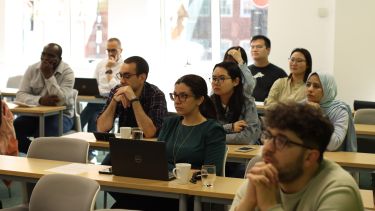
Applications are welcomed in all Economics topics. We particularly welcome applications from candidates with research interests in the following speciality areas of our research-active staff:
Behavioural Economics
- Behavioural Health Economics and Policy
- Behavioural Labour and Organisational Economics
- Decisions under Risk and Uncertainty
- Experimental and Behavioural analyses of markets
- Charitable Behaviour
- Analysis of Conflict and Conflict Resolution
- Behavioural Welfare Economics (including subjective wellbeing)
Financial Economics and Household Finance
- Banking and financial stability
- Household portfolios
- Household wealth inequality
- Household saving
- Household financial vulnerability and asset accumulation
Gender, Race and Inequality
- Domestic violence
- Discrimination and Wellbeing
- Identity Economics (gender, ethnicity, inequality)
- Wealth inequality and racial wealth gap
- Affirmative Action Policies
Health Economics
- Healthcare and demographics
- Health, wellbeing and employment
- Long-run impact of COVID
- Aversion to inequality in multidimensional wellbeing
- Health state valuation and stated preferences
Industrial Organization
- Competition Policy
- Innovation, industrial policy and mixed markets
- Networks and Regulation
- Firms Productivity
- Tax compliance and administration
International Economics and Development
- Empirical development economics
- Foreign aid and development finance institutions
- Foreign Direct Investment and Economic Growth
- Trade models with heterogeneous firms, trade gravity and productivity growth
- Trade policies and public economics
Labour and Education Economics
- Empirical studies on the relationships between labour, health and wellbeing
- Education Economics
- Gender differences in human capital accumulation
- Labour market transitions of (young) workers
- Social mobility
- Vocational education
- Wages, employment and contract type
Macroeconomics
- Open Economy Macroeconomics
- Business Cycles
- Dynamic Stochastic General Equilibrium Modelling
- Labour Market Dynamics
- Search and Matching
Political Economy
- Elections, political ideology, institutions and economic policy
- Immigration: causes and consequences
- Terrorism, public attitudes and behavioural outcomes
- Rent-seeking and other contests
Time Series Econometrics
- Econometric detection of bubbles and crashes
- Specification testing and forecasting in non-linear Econometric/Time-Series models
- Theoretical econometrics and statistical inference
Urban and Environmental Economics
- Environmental economics and environmental policy
- Environmental reporting
- Real estate economics
- Local labour markets
- Agglomeration externalities
- Spatial distribution of economic activities and innovation
- Transport economics
- Local economic impacts and drivers of internal and external immigration
- Local and regional determinants of social mobility and inequality
- Levelling-up: drivers of local productivity and growth
Related information
How to apply for a PhD
Search for PhD opportunities at Sheffield and be part of our world-leading research.
Artificial Intelligence and the Skill Premium
How will the emergence of ChatGPT and other forms of artificial intelligence (AI) affect the skill premium? To address this question, we propose a nested constant elasticity of substitution production function that distinguishes among three types of capital: traditional physical capital (machines, assembly lines), industrial robots, and AI. Following the literature, we assume that industrial robots predominantly substitute for low-skill workers, whereas AI mainly helps to perform the tasks of high-skill workers. We show that AI reduces the skill premium as long as it is more substitutable for high-skill workers than low-skill workers are for high-skill workers.
Corresponding author: David E. Bloom. The views expressed herein are those of the authors and do not necessarily reflect the views of the National Bureau of Economic Research.
MARC RIS BibTeΧ
Download Citation Data
Working Groups
More from nber.
In addition to working papers , the NBER disseminates affiliates’ latest findings through a range of free periodicals — the NBER Reporter , the NBER Digest , the Bulletin on Retirement and Disability , the Bulletin on Health , and the Bulletin on Entrepreneurship — as well as online conference reports , video lectures , and interviews .


- Previous Article
- Next Article
The May 2024 issue of IMF Research Perspectives offers a concise overview of digitalization, artificial intelligence, and other new technologies. It looks at trends and poses open questions to stimulate discussion and further exploration. The articles investigate the effects of these new technologies on productivity, labor market, and capital flows while highlighting the potential challenges of their broader use. A global perspective is offered by focusing on advance and emerging market and developing economies. The issue also includes an interview with IMF Research Department Division Chief, Prachi Mishra.

- Download Figure
- Download figure as PowerPoint slide
Chief of the Systemic Issues Division, Research Department, IMF

Prachi Mishra came back to the IMF in 2020 as the Division Chief in the Systemic Issues Division in the Research Department, after working in both the private and public sectors. In this in-depth interview, we talked about her career and the role of research for policymaking and discussed her views on current economic challenges and female representation in economics .
Here is a brief excerpt from the interview :
Mariarosaria Comunale : What is something that a researcher can bring which can benefit policymaking and can, in general, help in more operational work?
Prachi Mishra : Researchers can benefit operational work hugely by bringing their analytical skills to address important questions.
In an institution like the IMF, it is important to direct our resources and energy to questions of first order importance to policymakers globally. Being on the other side of the table, I can say that high quality and rigorous analytical work is deeply valued by the authorities. You will be surprised that the authorities actually check our CVs and they know our papers. When I was the mission chief of El Salvador, I was pleasantly surprised that the central bank head knew my work on international labor flows and brain drain.

Table of Contents
- Front Matter
- An Interview with Prachi Mishra
- Did the COVID-19 Recession Increase the Demand for Digital Occupations?
- AI and Services-Led Growth: Evidence from Indian Job Adverts
- Do Capital Inflows Spur Technology Diffusion? Evidence from a New Technology Adoption Index
- Is the Impact of AI Different from IT?
- Jacques Polak 24th Annual Research Conference: Global Interdependence
- View raw image
- Download Powerpoint Slide
International Monetary Fund Copyright © 2010-2021. All Rights Reserved.
- [66.249.64.20|185.80.150.64]
- 185.80.150.64
Character limit 500 /500
share this!
May 13, 2024
This article has been reviewed according to Science X's editorial process and policies . Editors have highlighted the following attributes while ensuring the content's credibility:
fact-checked
Research examines factors of resilient city development
by Higher Education Press
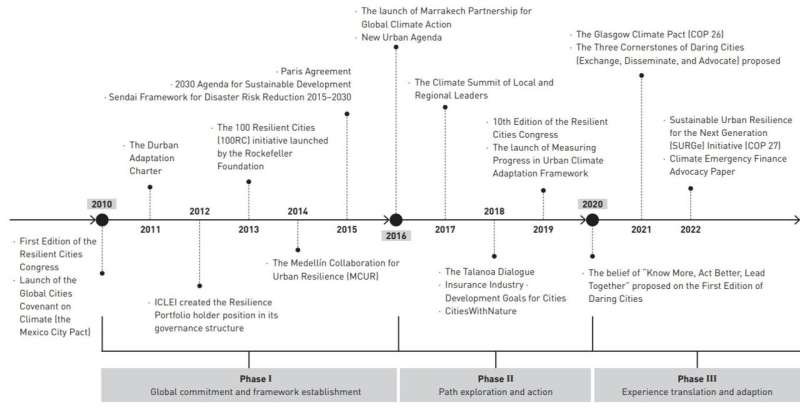
In recent years, with rapid urbanization, the global landscape of science and technology, industry, energy, and finance has undergone profound changes. Concurrently, emergencies or sudden events including natural disasters, human-induced disasters, and socio-economic crises are posing unrelenting threats to regional environment and security.
The concept of the "resilient city," as an important principle in contemporary urban planning, emphasizes that the capacity of urban systems to absorb the impacts and pressures caused by uncertain events while maintaining essential functions, structures, and characteristics.
The Resilient Cities Congress was initiated by ICLEI (International Council for Local Environment Initiatives)–Local Governments for Sustainability in 2010, as the first annual global forum dedicated to resilient cities studies.
In 2020, the Resilient Cities Congress was renamed the "Daring Cities," with the aim of building on the legacy of the Resilient Cities Congress series, enhancing the leadership role of governments, researchers, business leaders , and community organizers in urban decision-making process when responding to emergencies or sudden events, and forming new methods of urban governance and multi-stakeholder partnership models.
Drawing from the materials and scholarly work presented at these congresses, this research comprehensively reviews the evolution of resilient cities over the last decade through the lenses of policies and actions, summarizing the cutting-edge and current trends.
The work titled " From Resilient Cities Congress to Daring Cities: Policies, Actions, and Hot Trends of Resilient City Development " was published in the journal Landscape Architecture Frontiers .
Overall, the journey of global resilient cities unfolds in three phases of global commitment and framework establishment, path exploration and action, and experience translation and adaption. And after synthesizing the cases of global pioneering resilient city and regional construction cases from the Daring Cities, the experience of resilience actions can be summarized in five aspects:
- Multi-level governance and multi-stakeholder collaboration.
- Developing circular economy, and financing resilience and insuring cities.
- Nature-based solutions.
- Equal opportunities and access to basic services.
- Open data and strong data governance capability.
Throughout the previous Resilient Cities Congress series, the development of resilient cities in the past decade has evolved from theoretical exploration, framework establishment, and formulation of target strategies towards the implementation of regional and local actions and follow-up assessment, while integrating theoretical research into political decision-making that has in turn driven the progress of urban sustainable development.
Nowadays, with the development of big data and analytics technology, the construction of resilient cities not only requires deepening implementation at economic and social aspects, but also necessitates a series of effective measures in the field of cyber resilience to seize opportunities and mitigate risks, where information technology can and will play a vital role.
Looking ahead, it is crucial to further promote local resilience actions and practices, and to put more effort in filling the gaps of empirical research on resilient cities. It is of great practical significance to translate international resilience development results and action experience into localized efforts both in theory and practice at the national, regional, and city scales, so as to promote the full implementation of climate action and resilience building worldwide.
Provided by Higher Education Press
Explore further
Feedback to editors

Exploring the ultrasmall and ultrafast through advances in attosecond science
6 hours ago

Machine learning and AI aid in predicting molecular selectivity of chemical reactions

Persistent strain of cholera defends itself against forces of change, scientists find

Study reveals insights into protein evolution

Scientists help unravel life's cosmic beginnings
7 hours ago

Physicists create five-lane superhighway for electrons

Fruit fly testes offer potential tool against harmful insects

Researchers find new approach for antibiotic development

Exceptionally large transverse thermoelectric effect produced by combining thermoelectric and magnetic materials

Chemical analysis of natural CO₂ rise over the last 50,000 years shows that today's rate is 10 times faster
8 hours ago
Relevant PhysicsForums posts
The secrets of prof. verschure's rosetta stones.
May 9, 2024
A very puzzling rock or a pallasite / mesmosiderite or a nothing burger
May 8, 2024
M 4.8 - Whitehouse Station, New Jersey, US
What is global warming due to, large eruption at ruang volcano, indonesia.
May 2, 2024
Tidal friction and global warming
Apr 20, 2024
More from Earth Sciences
Related Stories

Are sponge cities a solution to growing urban flooding problems?
Oct 5, 2022

What next after 100 Resilient Cities funding ends?
Jun 6, 2019

Building African cities that cope with climate shocks—experts outline what it will take
Nov 30, 2023

Turning to nature to improve vital water treatment
Apr 22, 2024

Transforming urban sustainability: New study reveals cities' crucial contribution to meeting decarbonization goals
Aug 31, 2023

Defining a city using cell-phone data
Apr 5, 2024
Recommended for you

Research team develops an impact-based forecasting system for improved early flood warning
9 hours ago

New study examines the price tag of phasing-out coal
13 hours ago

Weaker ocean currents lead to decline in nutrients for North Atlantic ocean life during prehistoric climate change
May 11, 2024

Wildfires in old-growth Amazon forest areas rose 152% in 2023, study shows
May 10, 2024

New 'forever chemical' cleanup strategy discovered
Let us know if there is a problem with our content.
Use this form if you have come across a typo, inaccuracy or would like to send an edit request for the content on this page. For general inquiries, please use our contact form . For general feedback, use the public comments section below (please adhere to guidelines ).
Please select the most appropriate category to facilitate processing of your request
Thank you for taking time to provide your feedback to the editors.
Your feedback is important to us. However, we do not guarantee individual replies due to the high volume of messages.
E-mail the story
Your email address is used only to let the recipient know who sent the email. Neither your address nor the recipient's address will be used for any other purpose. The information you enter will appear in your e-mail message and is not retained by Phys.org in any form.
Newsletter sign up
Get weekly and/or daily updates delivered to your inbox. You can unsubscribe at any time and we'll never share your details to third parties.
More information Privacy policy
Donate and enjoy an ad-free experience
We keep our content available to everyone. Consider supporting Science X's mission by getting a premium account.
E-mail newsletter
Team studies factors related to a sense of economic insecurity in older adults
The people of Japan have the highest life expectancy in the world. Yet older adults who struggle economically may refrain from seeking medical help or using long-term care insurance. These choices may increase the occurrence of frailty and its progression in people's lives. A team of scientists undertook a study of older adults to examine the connection between a sense of economic insecurity and a person's participation in social activities.
The results showed that a person's sense of economic insecurity was not associated with physical conditions, subjective symptoms of dementia, or social conditions. However, it grew with increased loneliness and decreased with a greater sense of well-being.
The team published their research in the journal PLOS ONE on March 28.
Statistics show that older adults account for 37.7 percent of Japan's suicide mortality rate. In 2022, the most common causes of suicide were "health problems," followed by "family problems" and "economic and lifestyle problems." The risk factors associated with frailty -- a state of increased vulnerability to health changes due to an age-related decline in bodily functions -- include low income. The Ministry of Health, Labour and Welfare encourages older adults to participate in social activities to prevent them from becoming frail.
"For low-cost social activities to function as a place for preventing frailty and suicide, it is necessary to investigate the actual state of the participants' economic insecurity and discuss how to provide support for effective social activities," said co-authors Yuriko Inoue and Hisae Nakatani, both from Hiroshima University's (HU) Graduate School of Biomedical and Health Sciences, in a joint response. Inoue is a Ph.D. student at the graduate school's Division of Integrated Health Sciences while Nakatani is a professor emeritus at the university.
The team conducted a cross-sectional survey to identify factors related to a sense of economic insecurity among older adults who participate in social activities. The people who participated in the survey were 65 years or older in age. They were people who voluntarily participated in low-cost community-based social activities, such as exercise and hobby activities. The self-administered survey form was distributed to 1,351 adults in Hiroshima City, Japan, during July to December 2022. The surveys were distributed to these adults by the staff of community general support centers.
To determine a person's sense of economic insecurity, the survey asked "Do you have economic anxieties?" Participants responded on a four-point scale where answers ranged from "not worried" to "worried."
There were also questions related to a person's physical condition and whether or not they had subjective symptoms of dementia. The survey also asked questions related to a person's social conditions. These questions focused on the frequency of outings, social activities, working status, and whether or not the person was socially isolated. The last category of survey questions focused on psychological conditions. These questions were designed to assess a person's loneliness and subjective well-being.
The team's survey results showed that 43.6 percent of older adults who participate in social activities had economic insecurity.
Their sense of economic insecurity was not associated with physical conditions, subjective symptoms of dementia, or social conditions, such as frequency of outings or social isolation. However, the team did note that the sense of economic insecurity was lower among older adults aged 85 and older, and higher among those who felt psychologically lonely and had a lower subjective sense of well-being.
"Given that nearly half of the older adults participating in social activities felt economic insecurity, receiving support to alleviate this issue through social activities could contribute to improving their mental health," said Inoue.
This study measured the subjective economic insecurity of older adults. However, the association between actual income and expenses could not be surveyed.
"Given the cross-sectional nature of the study design, further investigation through longitudinal and intervention studies involving factors based on objective indicators is needed to validate this association," said Inoue.
Looking ahead, the team suggests that background factors related to loneliness and subjective well-being should be analyzed, including the number of interactions and the level of intimacy involved in social support.
The team's results may lead health care providers who promote community-based social participation to consider support tailored to older adults' age and psychological and economic insecurities. Because nearly half of the older adults taking part in social activities felt economic insecurity, receiving support to ease this issue through social activities could contribute to improving their quality of life, including their mental health.
The research team includes Inoue, Nakatani, and Xuxin Peng from HU's Graduate School of Biomedical and Health Sciences and Ichie Ono from the Yasuda Women's University's Department of Nursing.
The research is funded by France Bed Medical Home Care Research Subsidy Public Incorporated Foundation and Hiroshima University Research Fellowship.
- Mental Health
- Social Psychology
- Consumer Behavior
- Poverty and Learning
- STEM Education
- Social Issues
- Social science
- Social inclusion
- Sociobiology
- Macroeconomics
- Social inequality
- Consumerism
- Social movement
- Adult attention-deficit disorder
Story Source:
Materials provided by Hiroshima University . Note: Content may be edited for style and length.
Journal Reference :
- Mitsuo Shintani, Keita Tamura, Hidemasa Bono. Meta-analysis of public RNA sequencing data of abscisic acid-related abiotic stresses in Arabidopsis thaliana . Frontiers in Plant Science , 2024; 15 DOI: 10.3389/fpls.2024.1343787
Cite This Page :
Explore More
- Fastest Rate of CO2 Rise Over Last 50,000 Years
- Like Dad and Like Mum...all in One Plant
- What Makes a Memory? Did Your Brain Work Hard?
- Plant Virus Treatment for Metastatic Cancers
- Controlling Shape-Shifting Soft Robots
- Brain Flexibility for a Complex World
- ONe Nova to Rule Them All
- AI Systems Are Skilled at Manipulating Humans
- Planet Glows With Molten Lava
- A Fragment of Human Brain, Mapped
Trending Topics
Strange & offbeat.

COMMENTS
A comprehensive list of research topics and ideas in finance, including corporate finance, fintech, banking and many more. About Us; Services. 1-On-1 Coaching. Topic Ideation; Research Proposal; ... The folowing research topic ideas are centred around international finance and global economic dynamics, delving into aspects like exchange rate ...
Behavioral Economics and Finance. Applied behavioral economics in marketing strategies. If you want to focus your attention on marketing, this topic is for you. Behavioral economics provides a peculiar lens to look at marketing strategies. It allows marketers to identify common behaviors and adapt their marketing strategies.
Engine No. 1, a small hedge fund on a mission to confront climate change, managed to do the impossible: Get dissident members on ExxonMobil's board. But lasting social impact has proved more elusive. Case studies by Mark Kramer, Shawn Cole, and Vikram Gandhi look at the complexities of shareholder activism. 1.
In addition to working papers, the NBER disseminates affiliates' latest findings through a range of free periodicals — the NBER Reporter, the NBER Digest, the Bulletin on Retirement and Disability, the Bulletin on Health, and the Bulletin on Entrepreneurship — as well as online conference reports, video lectures, and interviews.
This study sheds light on the political pathology of fraudulent, illegal, and corrupt business practices. Features of the Chinese system—including regulatory gaps, a lack of formal means of property protection, and pervasive uncertainty—seem to facilitate the rise of mafia systems. 02 Feb 2021. Working Paper Summaries.
IDEAS is the largest bibliographic database dedicated to Economics and available freely on the Internet. Based on RePEc, it indexes over 4,700,000 items of research, including over 4,200,000 that can be downloaded in full text. RePEc is a large volunteer effort to enhance the free dissemination of research in Economics which includes ...
The Journal of Finance publishes leading research across all the major fields of financial research. It is the most widely cited academic journal on finance and one of the most widely cited journals in economics as well. Each issue of the journal reaches over 8,000 academics, finance professionals, libraries, government and financial ...
David Laibson is a member of the National Bureau of Economic Research, where he is Research Associate in the Asset Pricing, Economic Fluctuations, and Aging Working Groups. ... Jeremy Stein's research has covered such topics as behavioral finance and stock-market efficiency, corporate investment and financing decisions, risk management ...
Overview. The Journal of Economics and Finance is the official journal of the Academy of Economics and Finance. It publishes theoretical and empirical research papers in economics and finance. Its primary focus is on empirical studies utilizing recent advances in econometrics with an emphasis on the policy relevance of the findings.
Welcome to the Oxford Research Encyclopedia of Economics and Finance. Learn about our Editorial Board. Browse the growing collection of articles, overviews and key subject works. Explore the Special Projects page, which includes individually edited collections on select subfields. Learn more.
Labs and Centers. Our faculty and affiliated researchers work across a wide range of disciplines and interest areas, using economic science to help tackle the complex issues surrounding global poverty, health care, education, and more. Learn more about our labs and centers.
1. Introduction. As a scholarly field of enquiry, finance has developed rapidly over the past 30 years - both in terms of the volume of published work and its quality (Ashton et al., 2009, p. 205).As a sub-discipline it now holds a credible position in business schools and social science faculties globally. 1 Considering it a sub-field of economics, Kelly and Bruestle (2011, Table 3) show ...
Research. Economics > Research. Our faculty has structured the department to have strong coverage in applied microeconomics, econometrics, economic theory, finance, and macroeconomics. Within these areas, our faculty work on a wide range of topics in economics important to the country and the world. Some of our most impactful work focuses on:
Decisions in Economics and Finance is a specialized forum for research on mathematics applied to various economic and social sciences. Publishes research in all areas of mathematics applied to economics, finance, insurance, management, and the social sciences. Gives priority to research that explores topics in mathematics or computational ...
A regional supplement to Current Issues in Economics and Finance covering a range of topics pertaining to the economy of the Federal Reserve System's Second District, including fiscal conditions, housing and credit markets, growth and productivity, and employment. This series, published from 1997 through 2014, has been archived. Do the Benefits ...
Journal of Economic Literature. The Journal of Economic Literature (JEL), first published in 1969, is designed to help economists keep abreast of and synthesize the vast flow of literature. Read more about the JEL. Current Issue Vol. 62, No. 1, March 2024 ... Research Highlight The pace of economics publishing.
This book discusses wide topics related to current issues in economic growth and development, international trade, macroeconomic and financial stability, inflation, monetary policy, banking, productivity, agriculture and food security. It is a collection of seventeen research papers selected based on their quality in terms of contemporary topic ...
Cogent Economics & Finance, Volume 1, Issue 1 (2013) See all volumes and issues. Vol 12, 2024 Vol 11, 2023 Vol 10, 2022 Vol 9, 2021 Vol 8, 2020 Vol 7, 2019 Vol 6, 2018 Vol 5, 2017 Vol 4, 2016 Vol 3, 2015 Vol 2, 2014 Volume 1, 2013. Download citations Download PDFs Download issue. Browse by section (All)
The Development and Sustainability in Economics and Finance publishes original research articles, review articles, case studies, and commentaries relating to all aspects of development and sustainability appearing in economic or financial issues. DSEF is a cross-disciplinary, scholarly, and …. View full aims & scope. $2300.
Opting for relevant finance thesis topics ensures that your research contributes to the existing body of knowledge and addresses contemporary issues in the field of Finance. Choosing a dissertation topic in Finance that is relevant to the industry can make a meaningful impact and advance understanding in your chosen area. 2. Personal Interest.
Although there is theoretical and empirical evidence of the differences in the quantity and quality of research outputs by discipline (Swanson, 2004), the above-mentioned finding could be extrapolated to researchers and research teams that promote given topics not only in finance but in economics and business as well (Zeng et al., 2017).
600 Accounting and Finance Thesis Topics. Embarking on a thesis in accounting and finance is a pivotal step in a student's academic journey. This section provides a comprehensive list of accounting and finance thesis topics, each tailored to reflect the most current issues and anticipate future directions in the field.
Behavioural Economics. Behavioural Health Economics and Policy. Behavioural Labour and Organisational Economics. Decisions under Risk and Uncertainty. Experimental and Behavioural analyses of markets. Charitable Behaviour. Analysis of Conflict and Conflict Resolution. Behavioural Welfare Economics (including subjective wellbeing)
Currently, an interesting topic of research in the field of economics and finance may be the impact of the SARS-CoV-2 coronavirus pandemic causing Covid-19 disease on the economic processes of ...
Working Paper 32451. DOI 10.3386/w32451. Issue Date May 2024. Monetary rules may have a large effect on the outcome of trade wars if central banks target the CPI inflation rate or more generally changes in the relative price of traded goods. We lay out a two-country open-economy model with sticky prices where countries engage in trade wars.
Following the literature, we assume that industrial robots predominantly substitute for low-skill workers, whereas AI mainly helps to perform the tasks of high-skill workers. We show that AI reduces the skill premium as long as it is more substitutable for high-skill workers than low-skill workers are for high-skill workers.
The May 2024 issue of IMF Research Perspectives offers a concise overview of digitalization, artificial intelligence, and other new technologies. It looks at trends and poses open questions to stimulate discussion and further exploration. The articles investigate the effects of these new technologies on productivity, labor market, and capital flows while highlighting the potential challenges ...
In recent years, with rapid urbanization, the global landscape of science and technology, industry, energy, and finance has undergone profound changes. Concurrently, emergencies or sudden events ...
The team conducted a cross-sectional survey to identify factors related to a sense of economic insecurity among older adults who participate in social activities. The people who participated in ...
At the start of the pandemic, John Barnett, a serial app creator, moved to the city, which is where his wife grew up. In 2022, within days of being sacked by Twitter, he got together with tech ...